BABSON
‘The New Electricity’ – Inside AI and Entrepreneurship


SUMMER 2023
AI-assisted cover artwork created in Midjourney
PEOPLE OF BABSON / 9 ‘GREATER IMPACT’ / 10 THE WEISSMAN LEGACY / 30 NEWS, NOTES, AND NODS / 34 PAGE 18
The pace of change in business and society is driven by technological advances, social dynamics, and the effects of the pandemic, permanently posing new challenges and opportunities. We see it in new technologies and business models that shape new markets and revolutionize industries, and we see it in new demands and expectations for hybrid and digital-only work and learning. These phenomena present new opportunities to collaborate with diverse and inclusive communities around the world
There’s no going back. The rapid rate of change is our new reality. The leaders and organizations that embrace that reality will race forward, while others will be left behind.
As the No. 1 school for entrepreneurship for three decades, Babson College chooses to charge forward. We have a responsibility to lead in this new era. I recently sat down with Babson Magazine to re ect on how the College has navigated this pace of change and how we’re positioned for even greater impact over the next few years.

Babson scholars de ne entrepreneurial leaders as “individuals who possess a growth mindset and demonstrate high levels of emotional, social, and cognitive competence to facilitate follower intrinsic motivation to act entrepreneurially.”* The need to educate entrepreneurial leaders who can tackle the most critical global issues has been especially urgent in higher education, a volatile market undergoing seismic shifts even before the pandemic. At Babson, we recognized that if we solve these new challenges in creative and sustainable ways, we could create competitive advantages to position the College for even greater impact. And, we’ve been doing that— much to the credit of our faculty, students, alumni, and entire community. Read more in the Q&A beginning on Page 10.

The accelerated pace of change is perhaps most dramatically seen in the rapid rise of generative AI. This emerging technology poses exciting and unique challenges and opportunities, as well as some daunting questions. In this issue, Babson experts— faculty and alumni—explore the rami cations for entrepreneurs and offer their insights at the dawn of the Generative AI Era (Page 18).
Symbolic of our new reality, it’s an era full of uncertainty and opportunity—the type of situation in which the Babson community is prepared to lead and thrive.
Stephen Spinelli Jr. MBA’92, PhD
FROM THEPRESIDENT
* “An Integrated Conceptual Model of Entrepreneurial Leadership: New Frontiers for Research,” Scott Taylor, Danna Greenberg, Andrew C. Corbett, Keith Rollag, Jeffrey Shay, and Wendy Marcinkus Murphy, Academy of Management Journal
Eric Beato PUBLISHER Kerry Salerno, chief marketing officer COMMUNICATIONS STRATEGY Danielle Perry CREATIVE MANAGEMENT Cheryl Robock
CREATIVE ART DIRECTION Cathy Cahill
SENIOR JOURNALISTS Hillary Chabot, John Crawford
CONTRIBUTORS Kara Baskin, Scott Dietz, James Kiley, Marissa Langdon, Bryan Lipiner, Francis Ma, Erin O’Donnell, Thecla Ree, Mali Reimer, Melissa Savignano, Wendy Schoenfeld
MULTIMEDIA TEAM Christopher Brown, Paul DeWolf, Maggie McGinnis, Adam Pearlman
10 ‘Greater Impact’
President Spinelli on the College’s journey and vision.
14 Celebrating the Class of 2023
Curtis Johnson ’23 and Martha Buckley MBA’23.
18 The Age of AI
Experts explore what entrepreneurs need to know.
26 Fighting for Those Too Often Forgotten Sandra Bravo MBA’87 tackles foster care.
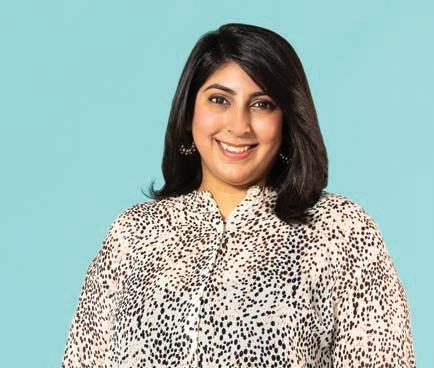
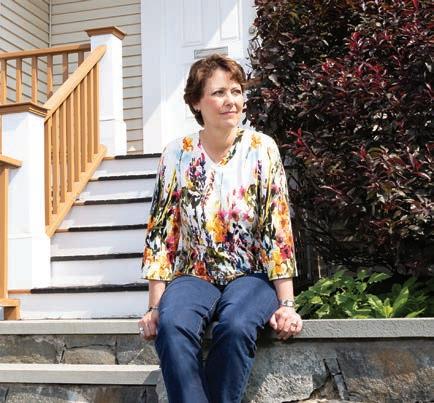
2 Babson and Beyond
8 Office Hours Yunwei Gai and colleagues pioneer health research.
9 People of Babson
30
Spotlight
34 News, Notes, and Nods Undergraduate, Graduate, In Memoriam
40 Entrepreneurial Leadership in Action Marvin Makofsky ’64 works to solve food insecurity.
Babson Magazine (USPS 898-140) is published by Babson College, 231 Forest Street, Babson Park, MA 02457-0310, three times a year, in the spring, summer, and winter. Copyright 2023 by Babson College. Editorial office: Babson Park, MA 02457-0310. Send address corrections to advancement_services@babson.edu, or call +781-239-4044. BABSON MAGAZINE
Vol. 90, No. 2
STAFF /
EDITOR
out
feedback
On the cover: Artwork created by Cathy Cahill, using artificial intelligence software Midjourney. TABLE OF CONTENTS FEATURES
Find
more about what’s happening at Babson College at: entrepreneurship.babson.edu We welcome your
on the magazine. Contact Eric Beato at ebeato@babson.edu
DEPARTMENTS
The latest news and updates from campus.
Anjali Wali ’09 on keeping fellow alumni connected.
Advancement
Scholars reflect on the enduring Weissman legacy.
26 9 SUMMER 2023 / BABSON MAGAZINE 1
BABSON AND BE Y OND
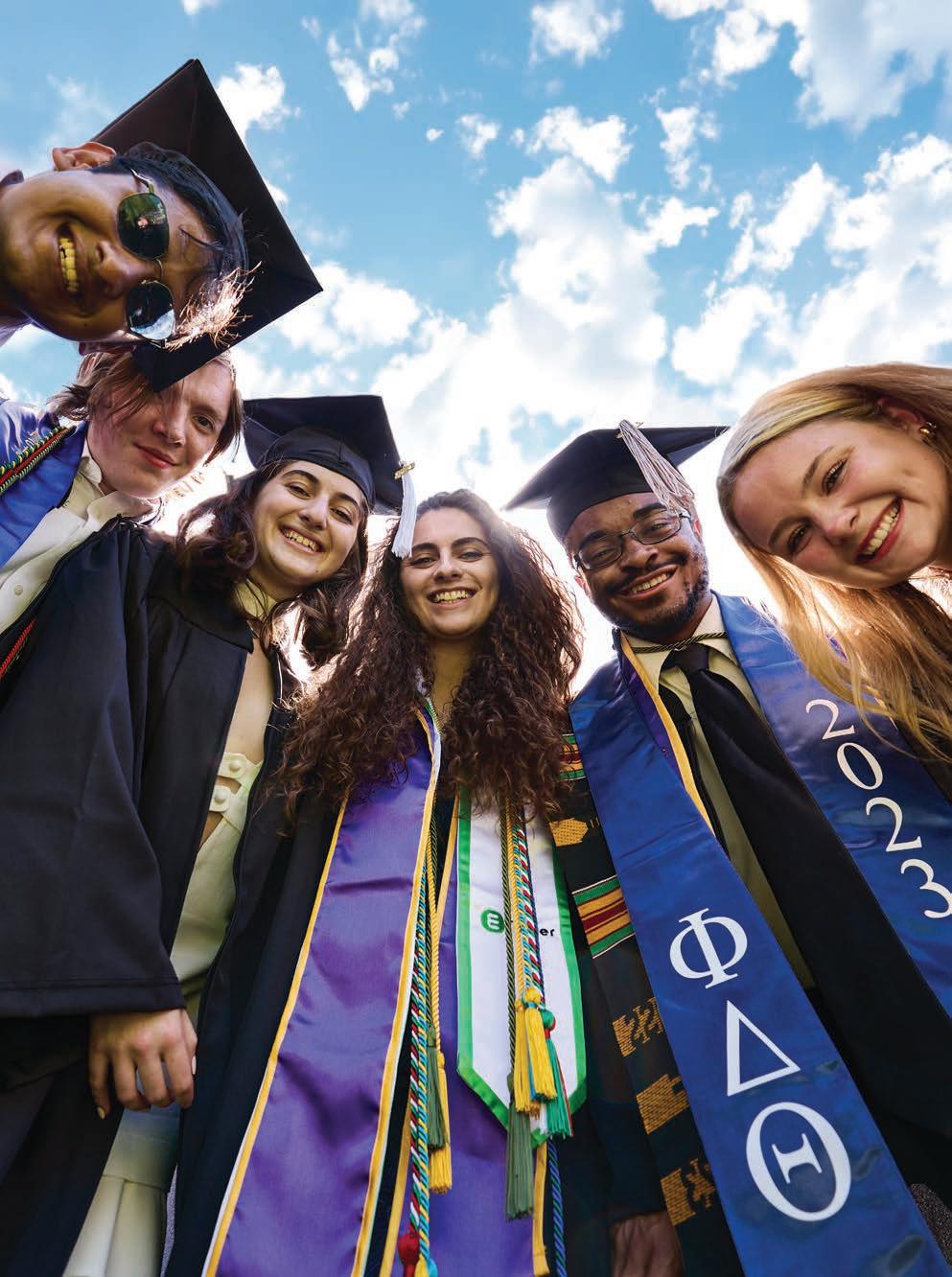
2 BABSON MAGAZINE / SUMMER 2023
PHOTO: MICHAEL QUIET
Message to the Class of 2023: LEAD WITH LOVE
Under a picturesque blue sky, the Babson College community celebrated the Class of 2023 with an array of motivational and inspirational speeches during the undergraduate and graduate Commencement ceremonies in May.
Tim Ryan ’88, H’23, U.S. chair and senior partner at PwC, and Reshma Kewalramani H’23, CEO and president at Vertex Pharmaceuticals, delivered Commencement addresses at the undergraduate and graduate ceremonies, respectively. Ryan and Kewalramani also received Honorary Doctor of Humane Letters degrees, which also were presented to Martha DiMatteo Vorlicek ’81, H’23, senior advisor at HarbourVest Partners LLC; and Richard W. Sorenson MBA’68, H’23, P’97 ’00, G’27, former president of Carling Technologies Inc.
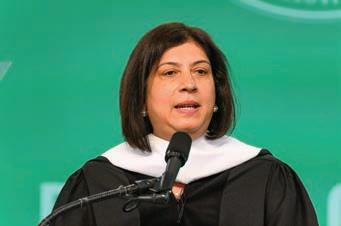
As the undergraduate Commencement speaker, Ryan delivered a deeply personal and moving message about leading with love. He recounted his rst day as an employee at PwC 35 years ago, when he stood out because of his Searsbought suit and short-sleeve white polyester shirt. At lunch, one of the
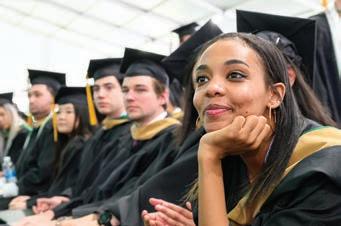
instructors pulled him aside and took him to Filene’s Basement, buying him two proper, long-sleeve cotton shirts.
“That instructor showed me love,” he said. “That instructor was a Babson alum.”
Ryan also recounted the earliest days of his tenure as U.S. chair and senior partner at PwC in 2016, when a series of racially motivated violence roiled the country and rocked his employees. Under his leadership, the rm shut down for a day for a companywide discussion about race. “We shed more tears on July 21, 2016, than we had in our 160-year history cumulatively, and most importantly, we began to learn about each other.”
“My advice to you is the same advice I give to CEOs today. I know you have great plans—I did—but just remember the people you’re counting on to help you achieve those great plans,” he said. “Business is about people, and leading people is about love. And so my simple message for the Class of 2023 …”
He paused to hold up his Commencement cap adorned with a heart.
“… I want you to lead with love.”

PHOTOS: JUSTIN KNIGHT
Read more: bab.sn/FrankEileenCWEL
Read about the Class of 2023: Pages 14–17
SUMMER 2023 / BABSON MAGAZINE 3
Tim Ryan ’88, H’23 (top) closes his heartfelt address to the undergraduate class. Reshma Kewalramani H’23 (middle) addresses the graduate ceremony (below).
GLOBAL CHANGEMAKER AWARD WINNERS Honored for Social and Environmental Impact

From securing jobs for youths in underresourced communities in Tunisia to pioneering ambitious social and environmental goals at a $1.3 billion company in Costa Rica, evidence of positive changes made by the latest recipients of Babson’s Global Changemaker Award can be seen across the world.
The 2023 honorees are Ramón Mendiola Sánchez ’86, P’20 ’21 ’23, CEO of the Florida Ice and Farm Company, based in Costa Rica; and Pawan G. Patil, PhD, a social entrepreneur and economist who has worked for more than 25 years in development banking and eco-ethical innovation.
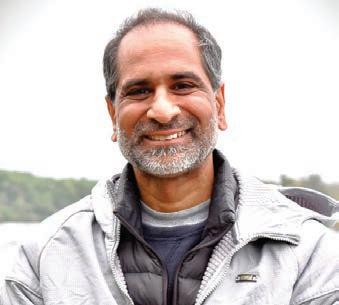
The Global Changemaker Award recognizes those in the Babson community for creating positive social and environmental change on a global level. The Institute for Social Innovation at Babson celebrates these changemakers and looks to promote
Babson’s role in reshaping the world, whether on campus, in the local community, or on a global scale.
Cheryl Kiser, executive director at the Institute for Social Innovation, said the recipients were honored for their lasting global impact and positive social change.
NEW FUND: Supporting Students, Honoring Carol Hacker
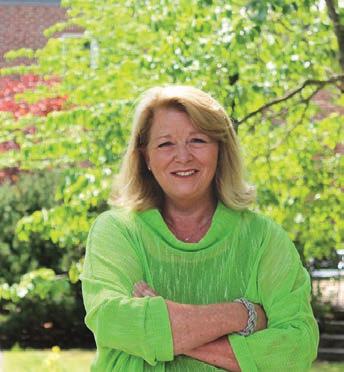
Jen Archambault Visco ’95 and her husband, Davide “Dave” Visco ’95, valued the additional opportunities they enjoyed as students at Babson but recognized those might be out of reach for some. “There are too many students who lack the nancial means to be able to take full advantage of the Babson experience,” said Dave, a member of the College’s Board of Trustees.
So, Jen and Dave Visco decided to do something about that. Working with Lawrence P. Ward, the College’s vice president and dean of campus life, they helped establish the Carol Hacker Endowed Student Life Fund, which supports deserving students who need assistance paying for extra expenses. “The fund is important,” Ward said, “because it expands opportunity to a more fulsome student experience to
more enrolled students.”
The fund is named in honor of Carol Hacker, a beloved staff member who left an impact on a generation of students, including the Viscos. Beginning in 1991, she played a big part in the life of Babson, holding nine jobs over 30 years. She served as chief of staff and vice president of the Alumni and Friends Network, and, for her rst 15 years, worked directly with students, including as dean of students.
“To me, Babson has always been about the people,” says Hacker, who retired in 2021 and today lives in Myrtle Beach, South Carolina. “I feel privileged to have known thousands of students and faculty and staff. I am very proud of those students today as alums and what they have done with their lives. I call many of them my friends.”
HACKER PHOTO: RYAN ELCOCK ’18
The Carol Hacker Endowed Student Life Fund was named in honor of Carol Hacker, who spent 30 years at Babson. Many of those years were spent working directly with students.
4 BABSON MAGAZINE / SUMMER 2023 BABSON
Ramón Mendiola Sánchez ’86, P’20 ’21 ’23 (left), CEO of the Florida Ice and Farm Company, and Pawan G. Patil, PhD (below), a social entrepreneur and economist, were the recipients of Babson’s Global Changemaker Award.
ANDBEYOND
DEI AT BABSON: ‘To Go Far, Go Together’
Small steps and token measures aren’t enough. If an organization is truly serious about addressing diversity, equity, and inclusion (DEI) issues, it needs to make a concerted, continuous, and all-encompassing effort.
Standing in Babson’s Knight Auditorium, before an audience of her College colleagues, Shakenna Williams ’94 spoke of the campuswide collaboration and community required for DEI, referencing the famous African proverb: “If you want to go fast, go alone. If you want to go far, go together.”
Williams, the executive director of the Frank & Eileen™ Center for Women’s Entrepreneurial Leadership, relishes working with others. “I value the voice of my teammates,” she said. “Everything we do is powered by the One Babson community.”
Williams spoke during the inaugural Inclusive Excellence Summit, an event in March that celebrated Babson’s many achievements in advancing DEI, one of the College’s core values. Priscilla Douglas, author, speaker, and executive coach, was the keynote speaker.
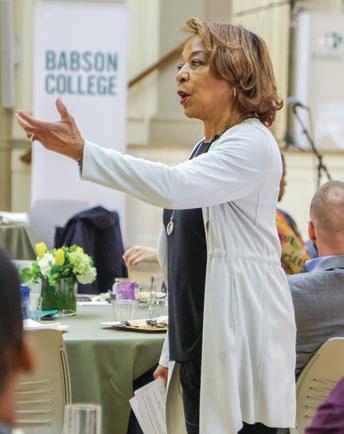
“These are the values we aspire to and try to live by,” said Sadie Burton-Goss, Babson’s chief diversity and inclusion officer, who organized the summit. “We come together for a noble purpose, to acknowledge the work that goes on at Babson every day.”
Over the course of a couple of hours, student, staff, and faculty leaders representing a range of campus departments presented a comprehensive
list of DEI initiatives while outlining plans and hopes for the future. They spoke of hiring, fundraising, vendor diversity, mentorship, counseling, support services, and a host of other issues.
“I am always overwhelmed by gratitude when the Babson community comes together, by the richness of the work we are accomplishing every day,” BurtonGoss said. “We are always creating, innovating, caring, and thinking about the ways of being a stronger community together.”
MBA REIGNS: Three Decades at No. 1
How do you lead the nation in cutting-edge graduate entrepreneurship education for a stunning 30 years in a row?
For Sebastian Fixson, the associate dean of graduate programs and innovation at Babson College, it takes constant progress and a commitment to live the very entrepreneurial ethos the College teaches.
“The ranking is a clear validation of everything Babson is doing. We’ve remained number one in entrepreneurship because we continually renew, rework, and improve our programs,” Fixson said.
“Since early on, we’ve explored new methods of experiential learning and integrated teaching to a totally new degree, and we’ve built that out over time
so we’re bigger and better than we were 30 years ago.”
And, while earning the No. 1 ranking for Best MBA in Entrepreneurship from U.S. News & World Report for the 30th consecutive year is cause for celebration, it’s also a confirmation of the College’s drive to innovate and expand the way entrepreneurship is taught.
“This is a moment of immense pride and celebration for the Babson community,” Babson President Stephen Spinelli Jr. MBA’92, PhD said. “The world needs entrepreneurial leaders in all fields to solve big and small problems. From startups to rapidly evolving larger businesses and even municipalities, Babson graduates are creating social and economic value.”
Men’s Polo and Men’s Rugby Clubs Win National Titles
Babson club sports teams earned two more national titles this spring. The men’s polo team repeated as national champion, defeating the University of Kentucky to win the Division II Men’s National Intercollegiate Championship. Captain Frederick Borja ’25 and his brother, Leonardo Borja ’25, were selected as Men’s National All-Stars. And, the men’s rugby club won its first national championship, beating Springfield College to earn the National Collegiate Rugby 7s Small College trophy, as Reed Santos ’24 was named the tournament MVP.
BFLP Earns HBCU Grant
The Babson Financial Literacy Project (BFLP) has been awarded a one-year, $103,000 Nasdaq Foundation Grant to bring financial literacy workshops to students at Historically Black Colleges & Universities (HBCUs). The pilot program, Closing the Financial Knowledge Gap for Students at HBCUs, includes comprehensive personal finance workshops to teach critical financial skills in a community setting. BFLP-trained facilitators will run virtual workshops during the 2023–2024 academic school year.
Collaborative Legacy Award
Candida Brush P’14, the F.W. Olin Distinguished Professor of Entrepreneurship, received the inaugural Babson Collaborative Legacy Award—in recognition of impactful research, teaching excellence, and distinguished service to the field of entrepreneurship education—at the Babson Collaborative Global Summit in March at the Universidad del Desarrollo in Santiago, Chile.
B.E.T.A. Challenge Grand Prizes
Three environmentally focused entrepreneurs— Amelia Thomas MBA’22 of River Otter Renewables Inc. (alumni track), Jennifer Calhoun MBA’23 of G.I. Junk Removal (graduate track), and Dylan Zajac ’25 of Computers 4 People (undergraduate track)— won Babson College’s prestigious B.E.T.A. (Babson Entrepreneurial Thought & Action®) Challenge in April.
PHOTO: MARK MANNE
SUMMER 2023 / BABSON MAGAZINE 5
Author Priscilla Douglas was the summit’s keynote speaker.
CHAMPIONSHIP CULTURE: Athletics’ Strategy Spurs Success
Mike Lynch, the Pamela P. and Brian M. Barefoot Associate Vice President for Athletics and Athletics Advancement, spent the spring collecting hardware for the successes of the Babson Athletics department.
For the first time in its history, Babson won the 2023 New England Women’s and Men’s Athletic Conference (NEWMAC) Men’s Presidents Cup, the prestigious all-sports trophy. Babson also finished as runner-up for the NEWMAC Women’s Presidents Cup.
Lynch also was honored as one of only four Division III recipients of the 2022–2023 Cushman & Wakefield Athletics Director of the Year Award by the National Association of Collegiate Directors of Athletics. “It’s really humbling, honestly. I’m really happy for our department,” he said. “It is reflective of the staff and the coaches and the athletes.”

The awards culminate a momentous year during which Lynch announced the department’s new comprehensive strategic plan and the addition of the women’s golf team, the first new varsity program since 2001. Lynch recently discussed the state of Babson Athletics, which is excerpted below. Read the complete interview at bab.sn/LynchQA
What are you most proud of since you arrived at Babson in 2016?
“We’ve become relevant nationally in a lot of different sports. Now, there’s this real championship culture that we have where every team wants to be a part of
it. Every coach who joins our program now has a sense that that’s the type of program that we are, that we chase championships, and we have student-athletes on podiums at the end of the year. That’s probably the most gratifying thing for me is seeing the growth of it over time and how the things that we’ve done strategically have really helped to put us in a good position. And, none of this happens without great coaches and student-athletes that buy into the program.”
How does Babson Athletics’ strategic vision connect to the College’s strategic plan?
“It’s important to us that Athletics isn’t seen as this entity that operates outside of the College. We’re fully integrated. For example, we’re really working hard at diversity, equity, and inclusion within the
department. That’s a goal of ours. What does it mean for Babson Athletics? Frankly, it means hiring more coaches that don’t look like me. It means bringing in student-athletes from different backgrounds. … Student-athletes, particularly student-athletes of color, if they’re looking at a place like Babson, they need to see people who look like them. We hired Kendall Elder, who is our associate athletic director for student-athlete success. Part of his job and his role is to present Babson as a more inclusive and supportive place for student-athletes who might come from underrepresented groups.”
What does the new women’s golf team mean to the athletics program?
“Investigating opportunities for expanding our program certainly was part of our strategic plan, and women’s golf was head and shoulders above any other program. Babson is the perfect place to add a women’s golf program. Our men’s program has grown to become one of the top 25 programs in the country. I think our women’s program could do the same. … Also, Babson is in a financial position unlike a lot of other schools that are dropping sports or adding sports simply to add bodies to their undergraduate population. Babson is in a position of strength right now where we have a whole different set of reasons for adding the program. We actually think we can be good in the sport.”
JUDY BLINSTRUB Retires After Legendary 39-Year Career
After one of the most successful coaching careers in Division III history, Babson head women’s basketball coach Judy Blinstrub announced her retirement in June. Blinstrub coached 1,049 games during her 39-year career, amassing a career record of 719-330 (.685 winning percentage). She ranks 11th in DIII history in victories and led the Beavers to the postseason 23 times, including 12 NCAA tournament appearances, six Sweet Sixteens, and

three national quarter nal appearances.
“Babson has been a part of my family and my home for so long,” Blinstrub said. “I have so many wonderful memories to re ect on. The student-athletes that I have had the opportunity to coach and mentor will forever have a special place in my heart. I will always treasure all the relationships I have formed in the Babson community and beyond throughout my career.”
PHOTOS: TEMI BAJULAIYE (LYNCH), JON ENDOW (BLINSTRUB)
Babson College’s Mike Lynch won the Cushman & Wakefield Athletics Director of the Year Award from the National Association of Collegiate Directors of Athletics.
6 BABSON MAGAZINE / SUMMER 2023 BABSON
ANDBEYOND
TWO NATIONAL RUNNERS-UP Put Babson Tennis on Path to Glory
For the rst time in a quarter century, Babson tennis returned to national prominence, thanks to a pair of women’s players who earned national runner-up distinctions in singles and doubles.
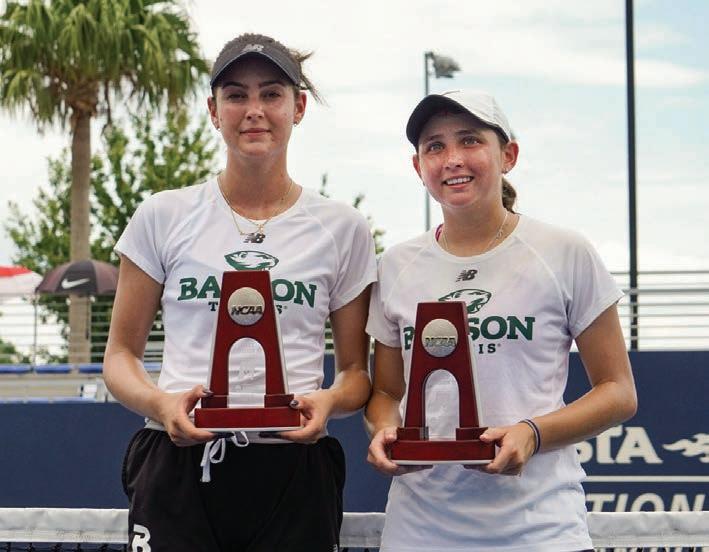
Olivia Soffer ’25 advanced to the singles national championship match, and she teamed with Matia Cristiani ’26 to reach the doubles national title event in May in Orlando, Florida.
“I remember the rst week at Babson, I told Coach (Michael) Kopelman I wanted to win individual NCAAs,” Soffer said. “He initially looked at me like I was crazy, but over time, we continuously worked toward that goal to end up where we are now.”
Soffer, who reached the quarter nals last year, won four singles matches over three days in her march to the nal—25 years after phenom David Weisman ’98 won the Division III Singles Championship in 1998, the only individual national champion in Babson history.
Soffer already is the most decorated player in program history, going 31-2 this year and earning her second consecutive Intercollegiate Tennis Association (ITA) All-America honor in singles. A twotime conference player of the year, she captured the program’s rst ITA New England singles championship in September and advanced to the semi nals of the ITA Cup.
“It was more exhausting to play in both draws,” Soffer said, “but all the more rewarding, too. Playing alongside Matia is an honor. She is genuinely one of my closest friends. We are polar opposites in game style, but that’s what makes playing with her so much fun.”
Soffer and Cristiani, who nished
13-1 this spring, won three straight doubles matches to reach the nal, becoming the rst doubles team in program history to collect ITA AllAmerica accolades.
“Advancing to the doubles national championship match was both beyond my expectations and within reach,” Cristiani said. “Playing in that match made me realize we had improved so much throughout the year and that it’s possible for us to beat anyone.
“Playing alongside Olivia is great because she makes me want to play my best. Our game styles complement each other well, and that makes playing more enjoyable.”
Cristiani is the rst player in program history to be selected ITA Northeast Region Rookie of the
Year after posting a 24-2 record and advancing to the second round of the NCAA singles championship. She also made it to the quarter nals of the ITA New England Championship.
“I am so excited to see what this team will accomplish next,” Soffer said. “We want to keep breaking records and setting ambitious goals. My sister is joining the team next year, which is an honor for me. I can’t wait to share the court with her and see what she brings to the team.
“Putting Babson tennis on the national map is something we have been talking about for a long time. It’s easier said than done, but the team’s success has shown that we are here to stay.”
“Our goal next year,” Cristiani said, “should be winning the national championship.” — Scott Dietz
Olivia Soffer ’25 (left) was the national runner-up in singles and partnered with Matia Cristiani ’26 to reach the doubles national final in a historic double feat for Babson tennis.
FOR MORE BABSON NEWS AND EVENTS: entrepreneurship.babson.edu PHOTO: TEMI BAJULAIYE SUMMER 2023 / BABSON MAGAZINE 7
Can Entrepreneurship Improve Health Outcomes?
Health economist Yunwei Gai and a team of Babson colleagues pioneer a new area of research
Researchers have long studied how entrepreneurship bene ts the health of local economies. But, Yunwei Gai, associate professor of economics, is one of the rst researchers to study how entrepreneurial ventures affect the health of the people who live nearby.
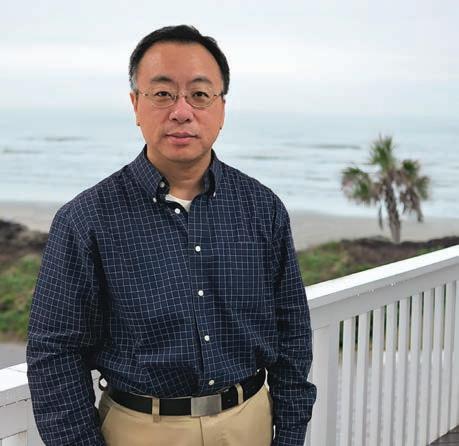
A Babson faculty member since 2007, Gai is a health economist who uses data analysis to examine healthcare markets, systems, and policy. He’s also interested in the “health ecology,” or the combination of factors that affect health outcomes in a community. With the help of a threeyear grant from the Faculty Research Angel Fund (FRAF), sponsored by the Arthur M. Blank School for Entrepreneurial Leadership, Gai teamed up with Babson colleagues for an interdisciplinary project exploring how healthcare entrepreneurship can alter a community’s health ecology and address health disparities.
“We’re looking at how entrepreneurship and entrepreneurs can help improve health outcomes in the U.S. and improve health equity across different socioeconomic and income backgrounds,” Gai explains.
Working with the Kerry Murphy Healey Center for Health Innovation and Entrepreneurship, the research team includes Wiljeana Glover, the Stephen C. and Carmella R. Kletjian Foundation Distinguished Professor of Global Healthcare Entrepreneurship and associate professor in the Operations and
Information Management Division; Candida Brush P’14, F.W. Olin Distinguished Professor of Entrepreneurship; and Alia Crocker, associate professor of strategy. Why would they expect entrepreneurship to yield healthier communities?
“Entrepreneurs by nature are very disruptive and very innovative,” Gai says. “They may approach problems with a very different perspective or mindset, and that can be extremely useful. We need new ways of delivering health care more ef ciently.”
To determine if healthcare startups in uence health outcomes, Gai collected 10 years of data on healthrelated measures in more than 3,000 U.S. counties. The data included the percentage of people who have health insurance per county, obesity rates there, the prevalence of binge drinking, and access to nutritious food, among many factors. He then merged this data with information about privately held, venture capital-funded healthcare service startups in these counties. His analysis revealed higher levels of entrepreneurship were linked to lower rates of diabetes, obesity, and HIV infection, but overall, “we didn’t nd a great impact,” Gai says. Because this is such a new area of research, he has returned to the drawing board,
considering how to design future studies to yield more meaningful information. It may help to zero in on one type of healthcare startup—say, primary care clinics or companies that make digital medical devices—so that “we can see more clearly how entrepreneurship activities contribute to well-being,” he explains. Gai adds that he and other researchers need more complete data about healthcare startups, including details such as locations of operation, management and ownership structure, and rms’ relationship to local governments.
“I know that entrepreneurship matters in health care, but I’ve never had a chance to do this research,” Gai says. He’s enjoying the collaboration. “My three colleagues are fabulous researchers, and we are learning a lot from each other.” — Erin O’Donnell
OFFICEHOURS
PLEASE VISIT OUR DIGITAL BOOKSHELF BABSON.EDU/BOOKSHELF Featuring Publications by Babson Faculty
8 BABSON MAGAZINE / SUMMER 2023
Yunwei Gai, associate professor of economics at Babson College
Small Talk with ANJALI WALI ’09

When Anjali Wali ’09 graduated from Babson, she didn’t really want to leave. “It’s a place that really always felt like home,” she says. As a Diversity Scholar, Women’s Leadership Scholar, and Presidential Scholar, Wali threw herself into every aspect of the College, including the South Asian students association, AMAN, where she served as president. So, after three years in the state treasurer’s office, she returned home in 2012. Now, as the director of regional programs and annual giving, Wali oversees the College’s 70 alumni clubs around the world. In many ways, she has never left Babson after all.
How do you describe your time as an undergraduate at Babson?

“Babson was the rst place where I saw myself in the population. These were all people who were really driven. They were diverse. They were academically rigorous. I really loved that because it challenged me a lot more. The other thing is that Babson was big for me socially. I really found myself here. When I graduated, I remember telling my mom that I’ve always been my best self when I was here. And, I do think that is why I came back to work here. I feel like that as an employee as well.”
What do you enjoy about visiting alumni around the world?
“When you do this job for as long as I have, you have dear friends all over the world, and it’s my job to socially engage with them to hear what’s going on, to take them out to dinner, to see the companies that they work in and the new initiatives and things they’ve built. I am a naturally curious person, so I would want to know anyways, but it’s my greatest joy that it’s my job.”
How important is Babson’s alumni network for the College?
“When you think about the value of an education today, the network does seem to me to be the irreplaceable piece of higher education. It is hard to gauge what the bene t of that network is going to be over time, and every school has a different one. For Babson, the things I have seen this network accomplish for one another, with one another, by one another—the value of it is so unquanti able. The alumni network and what that means to a person’s long-term life is hard to measure, but I think it is perhaps the most valuable.”
— Eric Beato
PHOTO: RON JAUTZ
READ OUR COMPLETE Q&A WITH ANJALI WALI: magazine.babson.edu PEOPLEOFBABSON SUMMER 2023 / BABSON MAGAZINE 9
‘Greater IMPACT’




 By Eric Beato
By Eric Beato
As he begins his fifth year with a clear vision for the future, President Stephen Spinelli Jr. MBA’92, PhD reflects on navigating the unexpected journey of the pandemic and how the challenges and solutions have the College poised to expand its leadership and impact.

10 BABSON MAGAZINE / SUMMER 2023
Stephen Spinelli Jr. MBA’92, PhD returned to Babson as its 14th president in 2019, a celebratory time as the College commemorated its Centennial, charting an ambitious course for Babson’s second century. That milestone year culminated with the announcement of the Arthur M. Blank School for Entrepreneurial Leadership, thanks to a transformational $50 million gift from Arthur M. Blank ’63, H’98.
Less than four months later, though, the COVID-19 pandemic hit, putting Spinelli’s new strategic plan, the College, and the world to the test. In the earliest days of navigating that crisis, Spinelli vowed that the pandemic wouldn’t alter the College’s plans but accelerate them. Three years later, the College not only has survived the challenges and uncertainty of the pandemic but also has thrived, positioning Babson for even greater impact amid a volatile higher education market.


Earlier this year, Babson’s Board of Trustees voted unanimously to extend Spinelli’s contract through June 2027. The president recently sat down with Babson Magazine to reflect on his first four years and share his vision for the future.
“We’re doing as well or better than we’ve ever done in the history of the College—the quality, selectivity, and diversity of our student body, the depth and quality of our faculty, the growth of our endowment. The Babson culture is one of continuous improvement, so the Babson education continually improves because of our faculty and our focus on experiential learning. Experiential learning has always been an important part of the Babson education, but it’s becoming more robust and more dynamic than it’s ever been. I’m particularly impressed with how the faculty are integrating it more with the curriculum. We’re also seeing the impact at the Arthur M. Blank School for Entrepreneurial Leadership and specifically the way in which our centers and institutes have become more cross-functional and a hub for collaboration, sharing programs and leveraging resources. Importantly, the Herring Family Entrepreneurial Leadership Village (HELV) is a gamechanging asset, taking community living to a new higher ed standard and creating an incredible platform for an entrepreneurship community. Both of these, the Blank School and the HELV, are real competitive advantages that will be difficult for others to replicate.”
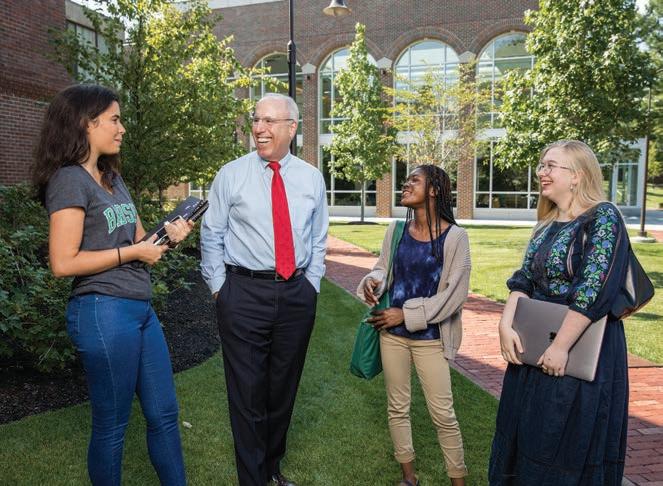
Your tenure has been a pivotal period in Babson’s history. Which accomplishments have been the most impactful?
SUMMER 2023 / BABSON MAGAZINE 11 PHOTOS: JAKE BELCHER
Q1
Meeting the Moment: COLLECTIVE IMPACT
The community’s collaboration elevated the College to new heights and continued to position Babson as an industry leader.
See some of the achievements across these pages, and learn more at babson.edu/meeting-the-moment
STUDENT OUTCOMES
98.7%
of the undergraduate Class of 2022 was employed, continuing education, or involved in volunteer, military, or service programs within six months of graduation
$116,935 Average salary of full-time MBA graduates 14% increase over the prior year
CLASS OF 2026 UNDERGRADUATE
SNAPSHOT
In March 2020, you said the pandemic wouldn’t alter the strategic plan but accelerate it. How did the College advance its plan and position Babson for the future?
“Our record fundraising, including the gift from Arthur Blank, provided an infusion of capital that allowed us to invest. All of the significant gifts—from alumni and others who believe in Babson—allowed us to invest more in the students’ education and experience, as well as award scholarships, recruit faculty, create endowed chairs, and plan the HELV. When others were cautious or contracting, we were expanding, so we lengthened the lead pretty significantly, including the creation of curriculum around leadership and a new concentration in tech entrepreneurship, with more opportunities and capabilities in the works.
“We also were forced into a more flexible delivery system, developing online and hybrid capabilities that may have taken years to develop. Instead, we did it almost overnight. We have fully embraced a more digitally infused delivery of education, much to the credit of our faculty, IT support, and the entire community.
656 enrolled students
27% international
7,607 number of applications
44% female
$71,385 Average undergraduate salary for Class of 2022, highest in Babson’s history
“We haven’t changed the brand, but we’ve elevated it. We have expanded from focusing on process to focusing on people. We talked about the entrepreneurial process, and now we’ve explicitly added the entrepreneurial leader. When you go from process to people, you expand your vision and include more people. The pandemic reality forced everyone to be more entrepreneurial, and Babson College proved more prepared and more able.”
56% domestic minority students
12 BABSON MAGAZINE / SUMMER 2023
Q2
Congratulations on your contract extension. What impact do you envision the College making over the next four years?
“The way we think about education is going to change over the next four or five years. Our ability to reach more populations with better education is going to be dramatically increased. Impacting communities is a big concept, and I believe that educational networks to elevate learning across society are going to evolve dramatically. Social networking, commercial networking, and what we’ve learned from the pandemic is going to lead to learning networks. The traction we’re getting, with the Blank School and through strategic affiliations with other institutions, encourages me that an educational network is going to blossom. And, if we’re smart, Babson is positioned to be a core player.”
Best MBA in Entrepreneurship, U.S. News & World Report, 30 consecutive years
Undergraduate school for entrepreneurship, U.S. News & World Report, 26 consecutive times
College for Business Majors, Money magazine
#1
RANKINGS
No. 11 for Best Career Placement among private schools, The Princeton Review

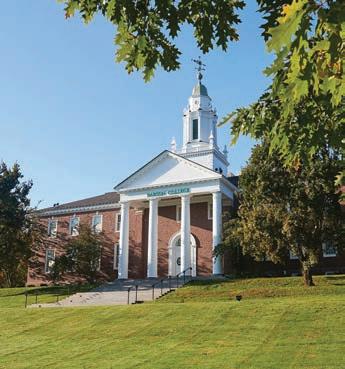
ONE BABSON
What motivates you to continue in your role, evolving the strategic plan and elevating Babson College?
33% 95% of all new staff hires were people of color Engagement with Diversity Inclusive Communications
of staff completed two DEI training programs:
FINANCIAL STRENGTH
$500M
Surpassed fundraising campaign goal ($200M more than original goal) $2.5M invested in tech upgrades to enhance classrooms and other spaces $4.2M in infrastructure upgrades or replacements
“It’s completing the plan. Babson is a unique community, and it’s going to be really interesting to see how it evolves. We’ve achieved great metrics, but we have to continue to bolster a business model that is more sustainable through more strategic alliances and diversified revenue streams. And, we need to evolve in a higher education market that is going through more changes than it has since World War II. Also, it’s an underlying belief in capitalism, in free enterprise, in entrepreneurship, and in education’s role in improving people’s lives. It’s that scaffolding of beliefs that makes Babson so special. We developed a competency in entrepreneurship decades ago, and the world recognizes now that it continually needs more and more of it. So, it feels like a responsibility and a privilege to be in an expansive market with a product or service that the world is demanding. It really is a thrill to be part of it. This is my career capstone. There’s no other job after this. Leaving a legacy is getting less important to me, but I do want to add value, and I want the world to be a better place. I can’t imagine having a better vehicle to make a greater impact.”
SUMMER 2023 / BABSON MAGAZINE 13
Q3
PHOTO: MICHAEL QUIET
Q4
UNDERGRADUATE




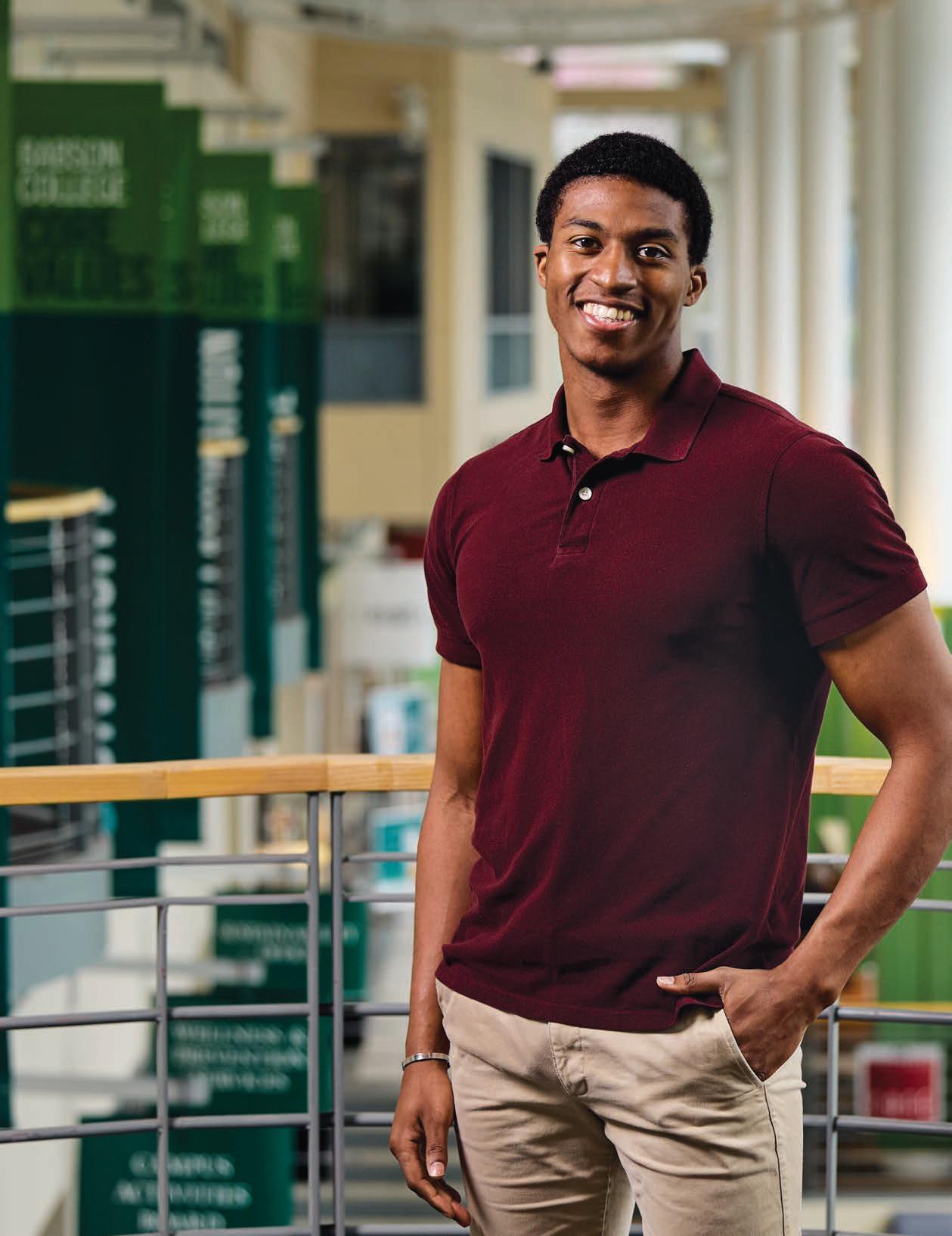 CURTIS JOHNSON ’23
CURTIS JOHNSON ’23
14 BABSON MAGAZINE / SUMMER 2023
By Hillary Chabot
PHOTO: MICHAEL QUIET
Curtis Johnson ’23 knows about resilience.
His lifelong dream, before Babson, was to serve in the military like his father. He had been accepted into the United States Military Academy at West Point, but the academy rescinded the offer, citing his eyesight.
An unexpected rejection in April of senior year would leave any high school student shaken. Not Johnson.
“It all worked out, because within a week, Babson called me and granted me the Baldwin Richardson Foods Scholarship,” Johnson says. He had already been thinking about a career in finance or starting a business as a backup career. “Babson is so well known for entrepreneurship, it seemed like a logical choice.”
The oldest son in a family of six children, Johnson learned about resilience and hard work from his mother, who would put in 16-hour shifts as an emergency operator at the Chicago Police Department.
“I saw that, and it really inspired me to work hard,” Johnson says. “She worked in order to take care of us, so really it was through example that she helped me become who I am.”
Johnson would wake up at 4:30 and do his homework on the bus to high school, where he served as captain of both the wrestling team and the football team.
Johnson continued his whirlwind pace at Babson, where he served as president of the Black Student Union (BSU) and was on the founding committee of The Johnson House, a dedicated living space for students of color, named for Eric Johnson ’72, P’08, the BSU founder and the president and CEO of Baldwin Richardson Foods Company, the benefactor of his scholarship. “I got this incredible opportunity to help put together a community on campus,” he says.
Johnson was a Babson Honors Program participant and former analyst at the Babson College Fund. He became a key figure at many student-run events, such as a rally in support of a Ukrainian student shortly after Russia’s invasion, and a fundraising campaign in response to the murder of George Floyd and other unarmed members of the Black community at the hands of police.
“It was a combination of saying yes to everything and a plethora of coincidences,” Johnson says. His early interest in investment banking and work with BSU led him to Wall Street Connection, a nonprofit dedicated to helping Black youth understand and access the financial services and advisory sector, which was a finalist in the B.E.T.A. (Babson Entrepreneurial Thought & Action®) Challenge.
Now, Johnson is working at the Royal Bank of Canada, but he plans to continue his efforts at Wall Street Connection and other nonprofits that promote equality in the financial services sector.
“As long as I’m inspiring someone to take that next step forward, no matter how big or small it is,” Johnson says, “I count that as a win.”
MORE STANDOUT 2023 UNDERGRADUATE STUDENTS
Calliope Cortright ’23, a Weissman Scholar and Natalie Taylor Scholar, traveled to Rwanda with the Global Health Innovation Lab, working in collaboration with the Kerry Murphy Healey Center for Health Innovation and Entrepreneurship, as well as University of Global Health Equity students and her team partner and fellow Taylor Scholar, Marchel Washington ’24, to help track and prevent rabies in Rwanda.
Cindy Escobar ’23 established the College’s Semillas Society, an organization creating community and connection among firstgeneration students. She also led Babson’s First-Generation Conference in April and participated in the College’s Women Innovating Now (WIN) Lab® Venture Accelerator program.
Jonathan Liskov ’23 was one of the inaugural Justice, Equity, Diversity & Inclusion (JEDI) Student Leaders and an ambassador for Multicultural and Identity Programs, creating the “Calling All White Men” event to challenge his peers to stand up and be strong allies.
Sophie Michels ’23, representing the third generation of her family business, served on the Bertarelli Institute for Family Entrepreneurship Advisory Board. She also was the president of the Babson Polo Club, which produced consecutive men’s national championship teams.
Gabriel Papa ’23 won the 12th annual Babson Trading Competition and placed in several other finance competitions. He also helped manage the Babson College Fund and served as a student assistant and manager at the Stephen D. Cutler Center for Investments and Finance.
Ysbely Santos ’23, a Posse Scholar, served on the Babson Origins of Necessary Equality (O.N.E.) executive board, and spearheaded the Black Lives Matter demonstration on campus in fall 2020.
Swarna Shiv ’23, named to BostInno’s 25 Under 25 list last fall, was a B.E.T.A. Challenge finalist in 2022 and a participant in the Summer Venture Program and WIN Lab. Her venture, Unsmudgeable, was recently accepted to MassChallenge.
Joyce Wang ’23, Roger W. Babson Award winner, served as president of the Student Government Association, president of the Babson Finance Association, and vice president of leadership development for Scholars of Finance.
Read more about the Class of 2023: bab.sn/babson2023
SUMMER 2023 / BABSON MAGAZINE 15
GRADUATE



 By Hillary Chabot
By Hillary Chabot

MARTHA BUCKLEY MBA’23
16 BABSON MAGAZINE / SUMMER 2023
PHOTO: MICHAEL QUIET
By
the time Martha Buckley MBA’23 started the
second year of her graduate degree at Babson, she was chief of academic affairs at the Graduate Student Council, had created a Food Insecurity Task Force on campus, and started working at Sunwealth, a clean energy impact investment company.
That was on top of co-leading an intensive, eight-month impact investment competition, a competition that focuses on a growing eld where investors back businesses achieving certain social and environmental bene ts in addition to generating nancial returns.
“It was de nitely a challenging juggling act,” Buckley says. “But it’s easy to dedicate that kind of time and energy when you’re very moved and passionate about what you’re working on.”
Her personable, high-touch style garnered acclaim across campus, and she was named to Poets & Quants’ Best and Brightest MBA list.
Before Buckley decided to get her MBA, she was the director of development at Heading Home, a nonpro t in Greater Boston helping those experiencing homelessness. A native of Essex, Massachusetts, Buckley had also worked at small startups and at corporations such as Staples, working in the company’s social impact programs.
“I’ve kind of been dancing around impact my whole career, sitting in a whole bunch of different roles around social impact,” Buckley says. “One of the things that I felt in every single one of those seats was that there is still a lot of gray space between the for-pro t sector and the public sector that just seemed really ripe for innovation.”
She also noticed that social impact had become far more important in the private sector. No longer were corporations dedicating a small portion of their pro ts toward social causes, but businesses were seeking to create pro t and social good at the same time.
Buckley contacted Cheryl Kiser, executive director of Babson’s Institute for Social Innovation, to discuss those trends, an engaging conversation that cemented Buckley’s commitment to attend Babson.
“It was really my conversation with her, and getting clear and speci c about what I wanted out of my MBA career, that made Babson seem like the right t for me,” Buckley says. “There’s de nitely a lot of great opportunities for somebody who’s very passionate about using social impact as a catalyst for good in the business world.”
Buckley said the opportunities to expand her knowledge of impact investing, both in and out of the classroom, came thick and fast after her rst semester. She spent the summer as a solar impact fellow at Sunwealth in Cambridge, Massachusetts, which asked her to join part time then offered her a full-time job after graduation.
“I feel like we’re at the dawn of a once-in-a-generation opportunity to ght for our climate,” Buckley says. “When you have that kind of opportunity, you don’t let it pass you by.”
MORE STANDOUT 2023 GRADUATE STUDENTS
Santucee Bell MBA’23, a Butler Institute for Free Enterprise Through Entrepreneurship Student Scholar and co-president of the Babson Black Graduate Club, worked with the Butler Launch Pad to create a panel of diverse funders and founders to help historically underrepresented entrepreneurs learn about funding options.
Rodrigo Custódio MBA’23, alongside several of his Blended Learning MBA Miami colleagues, participated in the Startup Showcase x Showdown competition at eMerge Americas in Miami. He worked to further connect Babson’s Wellesley and Miami campuses, particularly as a class representative in Babson’s Latin American Club.
Michael Hasibuan MSEL’23 and Omkar Vijayanand MSEL’23 reached the final round of the 2023 Boston Inno Madness competition with their hot meal vending machine startup, minute kitchen.
Deeksha Khanna MBA ’23 served as president of the Graduate Healthcare and Life Sciences Club, helping to introduce new graduate electives. She also was a graduate student communications assistant for the Kerry Murphy Healey Center for Health Innovation and Entrepreneurship, launching its newsletter.
Rohit Nayak MBA’23, a Social Innovation Scholar and Olin MBA Scholar, was a Business & Social Innovation Intensity Track graduate, where he worked on technology to turn air into water. He also was accepted as a fellow at the Clinton Global Initiative University in March, along with Sonal Dalvi MBA’23 and Kengo Yasue MBA’22.
Ellana Stinson MBA’23, an emergency medicine doctor and president of the New England Medical Association, served as medical director of the vaccine administration site at the Reggie Lewis Track & Athletic Center in Boston at the height of the pandemic.
Kristin Wendell ’07, MSBA’23, who received the Abdul Ali Award for the highest GPA in the MSBA program, won Babson’s second annual GEM (Global Entrepreneurship Monitor) Data Hackathon.
Kevin Wong Wong Keet MBA’23 served as vice president of finance for the Out Network, Babson’s LGBTQ+ graduate student organization, and graduated magna cum laude from Babson’s rigorous One-Year MBA program.
Read more about the Class of 2023: bab.sn/babson2023
SUMMER 2023 / BABSON MAGAZINE 17
By Kara Baskin


















Like a bolt of lightning, generative AI has struck, shocking nearly every aspect of business and society while also illuminating new possibilities. At the dawn of this new era, Babson College faculty and alumni explore the ramifications, dangers, and opportunities, providing seven things all entrepreneurs should know right now.










ARTWORK CREATED BY CATHY CAHILL, USING ARTIFICIAL INTELLIGENCE SOFTWARE MIDJOURNEY. 18 BABSON MAGAZINE / SUMMER 2023
The rise of generative artificial intelligence—which harnesses data to generate text, imagery, and audio with a few prompts—is poised to become an entrepreneurial game-changer. Ask language processing tool ChatGPT to compose an email, and it will spit one out. Command art generator DALL-E 2 to create an image of Jeff Bezos playing the accordion in a tutu for an ad campaign, and it will oblige.
These systems are automating creative and other work with enormous ramifications. There are pros: accelerated creativity, egalitarian tech for non-software engineers. There also are downsides, ranging from the politically sinister—systems pulling biased data to spread propaganda—to the economically devastating, such as the displacement of humans from creative jobs.
“It’s the new electricity,” says Rich Palmer MBA’16, managing director of Boston-based Launchpad Venture Group and former AI entrepreneur, on the transformative power of generative artificial intelligence.
“Much like a cell phone, AI is going to change how we interact with our computers and with each other in meaningful ways—and, if you don’t have an understanding of what generative AI can do and what its limitations are, you’re going to be left in the dust,” says Jonathan Griffiths, director of Babson College’s Weissman Foundry, an open-door design and prototyping studio exploring AI.
“At this point, if you have a startup and you don’t have a generative AI strategy, your board will be really unhappy with you, because that’s what everybody expects—in the same way that, if you didn’t have a social strategy
While much has been written about AI displacing humans, there is an upside: Now, workers who have never before written code could use generative AI to produce it.
“It further democratizes the entrepreneurial process,” Gilleran says.
“For tech startups, this will be a huge factor: the opening up of programming to people who don’t have technical backgrounds,” says Thomas Davenport, the President’s Distinguished Professor of Information Technology and Management. “From an entrepreneurship standpoint, it lowers the barriers for tech expertise to design new products. It’s a good thing for entrepreneurs.”
Right now, Davenport thinks prompt engineering is one of the most indemand AI jobs, especially in visual effects elds. These people know how to nudge systems to generate just the right, complex type of outputs (at least until generative AI gets even smarter and can do so itself).
“You need people who are ‘AI whisperers’—people who understand how these systems work and how to get the best out of them,” he says.
But, as AI rapidly changes over the next ve years, prompt engineering might become obsolete.
“AI is going to be able to take what you’ve implied in your comments and statements and generate what it thinks is the best response, and it’ll likely be close to what you get right now using a very engineered-level prompt,” Grif ths says. “I’m excited to see that kind of simpli cation of the technology. It’s going to increase the wider range and usage of that tech.”

15 years ago, it was a bad thing,” says Joshua Herzig-Marx MBA’08, a coach for early founders.
Babson faculty are quickly incorporating AI into the curriculum. Ruth Gilleran and Clare Gillan are co-faculty directors of Digital Technologies for Entrepreneurs, a required course for all Babson undergraduates. The course serves as an introduction for Technology Entrepreneurship, a new concentration launched last fall.

“We live in a time of tremendous disruption, and the pace of change has only accelerated,” Gillan says. “I want (students) to land on the right side of that continuous change.”
Here, Babson experts—including faculty and alumni—offer their insights and advice with seven things entrepreneurs should know at the dawn of the Generative AI Era.
It will enable non-engineers to innovate in new ways.
PHOTO: PAT O’CONNOR
We live in a time of tremendous disruption, and the pace of change has only accelerated.
1 SUMMER 2023 / BABSON MAGAZINE 19
— Clare Gillan, co-faculty director of Digital Technologies for Entrepreneurs
It’s the new electricity.
 — Rich Palmer MBA’16, managing director,
— Rich Palmer MBA’16, managing director,








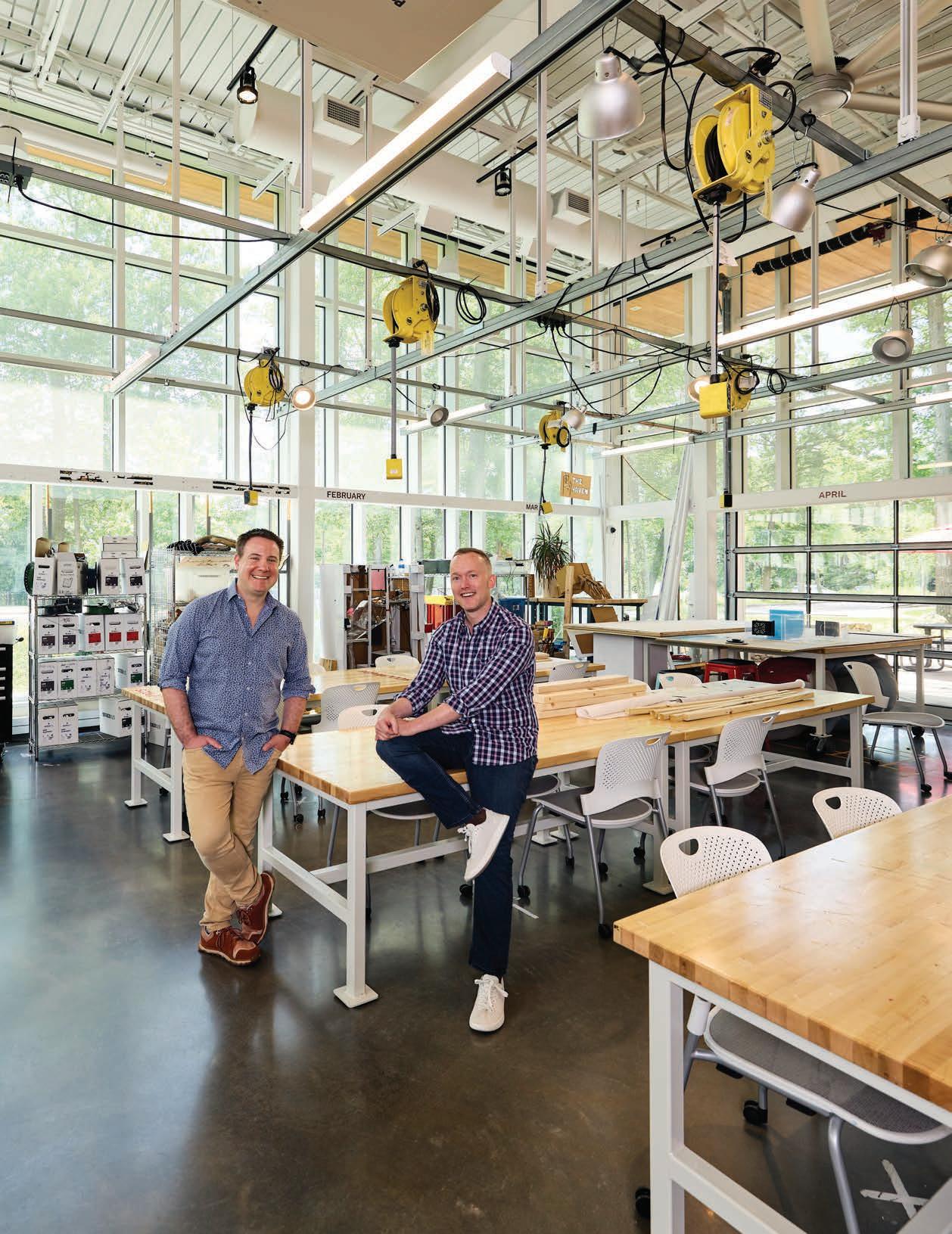 PHOTO: MICHAEL QUIET
Babson alumni Joshua Herzig-Marx MBA’08 (left) and Rich Palmer MBA’16 check out AI’s creative possibilities inside the College’s Weissman Foundry.
PHOTO: MICHAEL QUIET
Babson alumni Joshua Herzig-Marx MBA’08 (left) and Rich Palmer MBA’16 check out AI’s creative possibilities inside the College’s Weissman Foundry.
20 BABSON MAGAZINE / SUMMER 2023
Launchpad Venture Group
New technology is beguiling, but it should also be deployed wisely.
“Judgment is the big challenge (with generative AI), which is always one of the hardest things for any businessperson,” Herzig-Marx says. “There’s no reason to think that whatever pops out of ChatGPT or a text-to-image service is going to be something you would actually want to use.”
Generative AI can be incredibly useful for lesser tasks, but bigger asks? Think twice.
“Would I want to use it to design the interface for my new iPhone app? Probably not,” Herzig-Marx adds. “That seems really lazy: And, what’s the point in me as a founder if I don’t have strong opinions about that? But, if I need to run an ad on Facebook or need 10 different versions of the same thing for copy, absolutely. I’ll use it for non-mission-critical things.”
Moreover, generative AI isn’t always accurate.

“The technical phrase in the industry is that generative AIs can ‘hallucinate.’ It can make up facts, which I think is such a charming way to describe it. If you don’t have the experience, the judgment, you’re not going to know,” HerzigMarx warns.
He points to a recent case wherein a law rm submitted a brief using ChatGPT.
“It hallucinated a number of cases, which did not go over well with the judge, who was unimpressed that they submitted basically a false brief,” he says. “Judgment is really the hard thing, and increasingly, I think that’s what’s going to be missing.”
Content creation tasks that occupy an outsized amount of startup employees’ time, from composing training manuals to creating leave policies, could be expedited using generative AI—perhaps creating a universal set of standards while also freeing up bandwidth.
“If a startup needs to write a policy for paternity or sick leave, or if they need to do a policy for travel reimbursement, or all sorts of other kinds of nonbusiness critical things?” Herzig-Marx says. “I see a lot of people using it for that.”
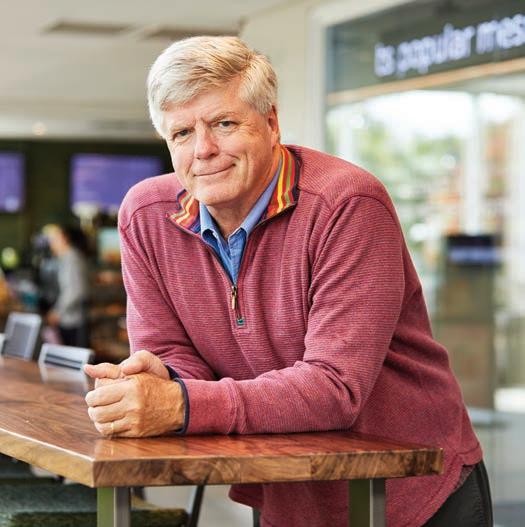
The nancial sector will bene t, too. While generative AI can’t customize your stock portfolio yet, it could be helpful nding answers to general process questions, such as how to set up a trust.
In an article for Forbes, Davenport noted how Morgan Stanley is using OpenAI’s GPT-4 to comb 100,000 of its internal documents for investment recommendations, “ ne-tune-training” the system to use it.
“Generative AI will rejuvenate the job of a knowledge manager,” he says. “This ne-tune-training solves, to a large degree, the hallucination problem, and knowledge can be private to a particular company. I think there are a lot of advantages to doing it for educating your frontline people and customer service applications.”
It should only be used in certain instances.
Knowledge and content management will be transformed.
PHOTO: PAT PIASECKI
From an entrepreneurship standpoint, it lowers the barriers for tech expertise to design new products. It’s a good thing for entrepreneurs.
2 3 SUMMER 2023 / BABSON MAGAZINE 21
— Thomas Davenport, the President’s Distinguished Professor of Information Technology and Management

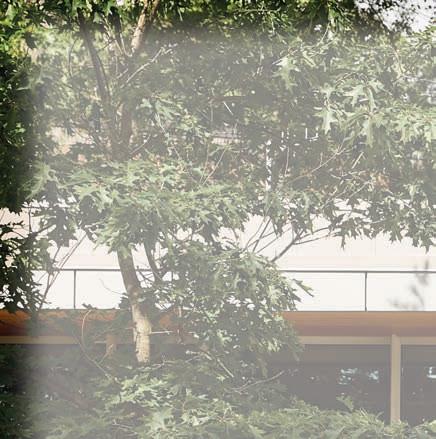



I could see (entrepreneurs) working with generative AI to solve the problems that they may not necessarily have the skills to solve right now.
22 BABSON MAGAZINE / SUMMER 2023
— Jonathan Griffiths, director, Weissman Foundry
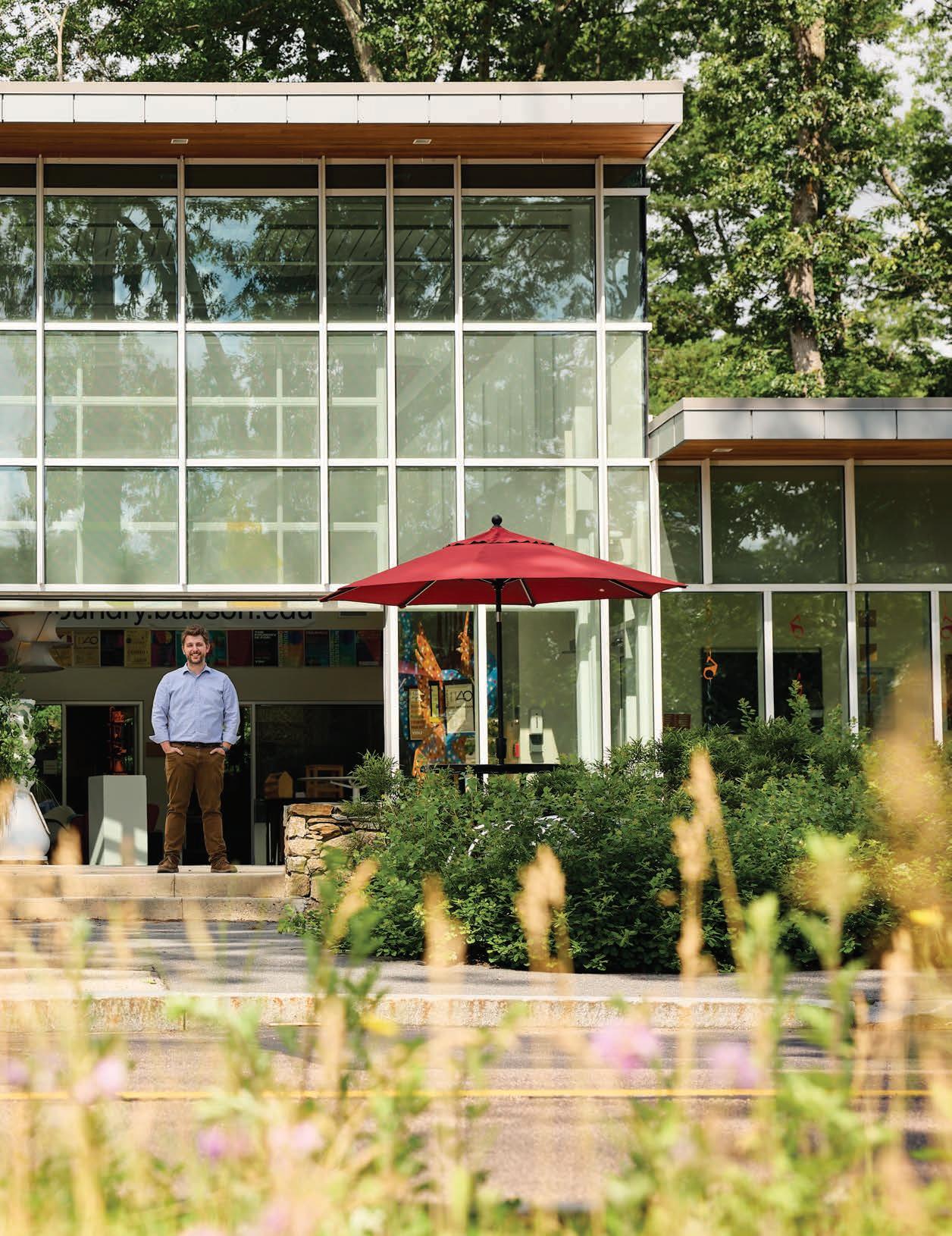
 PHOTOS: MICHAEL QUIET
PHOTOS: MICHAEL QUIET
SUMMER 2023 / BABSON MAGAZINE 23
Director Jonathan Griffiths stands outside Babson’s Weissman Foundry, an open-door design and prototyping studio, which also is the hub of artificial intelligence on campus.
Entrepreneurs have novel ideas. Software engineers execute them. It’s a time-consuming loop. Generative AI will fuse and accelerate the prototyping phase.
“I could see (entrepreneurs) working with generative AI to solve the problems that they may not necessarily have the skills to solve right now,” Grif ths says.
He notes that many budding entrepreneurs “lack engineering-level skills and are always looking for a technical co-founder. They’re looking for other people to help launch their company. While I don’t think that generative AI is going to totally replace that, I think it can help them jump initial entrepreneurial hurdles, helping them see if something’s even possible.” In essence: It’s great for dry runs.
“Generative AI enables the rapid prototyping of entrepreneurial ideas: literally a visualization and expression of an entrepreneurial idea that you can show to a target customer. You can get feedback on whether you’re on a compelling path and creating value, or whether your idea is a dud,” says Associate Professor Erik Noyes, who teaches Entrepreneurial Opportunities in AI.
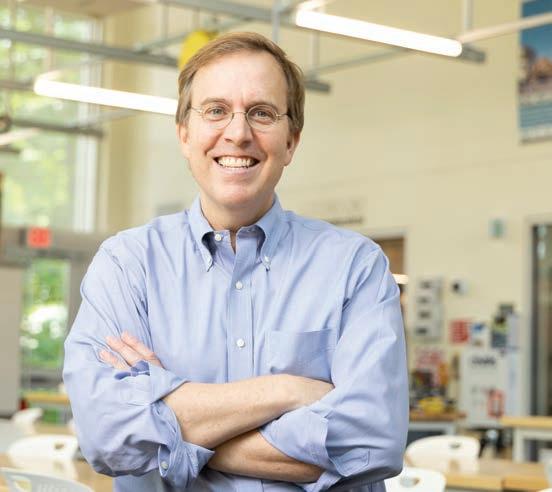
“You don’t have to spend weeks and engage with Photoshop. You can literally whip out approximations of product concepts in hours by yourself, with yourself in a creative cockpit.”
Beware of bias.
Generative AI is merely a means to an end, not an end in itself, says Associate Professor Davit Khachatryan, who specializes in machine learning and data science.
“The outputs of generative AI should be taken with a grain of salt,” he warns. “A typical user of generative AI doesn’t yet understand what happens under the hood and how those outputs get produced: Those are predictions produced by a large language model—an algorithm,” he says. “Taking the results of generative AI at face value is like the blind following the blind. Today’s entrepreneur, or any user of generative AI, needs to have an above-average understanding of how these tools work—and I think that’s where we analytics and data-science educators have a crucial role to play.”
“ ‘Generative’ literally means to generate new data based on the analysis and quote-unquote ‘understanding’ of the existing data,” Noyes says. “If the existing data is biased, there’s a strong likelihood that what’s generated can also be biased. You have to look at anything you’re doing in generative AI through the critical lens of ‘How could this just be re-expressing bias?’ ”

You don’t have to spend weeks and engage with Photoshop. You can literally whip out approximations of product concepts in hours by yourself, with yourself in a creative cockpit.
— Erik Noyes, associate professor of entrepreneurship, who teaches Entrepreneurial Opportunities in AI
PHOTO: LAURIE SWOPE
It will generate instant feedback, allowing entrepreneurs to assess viability quickly.
4 5 z 24 BABSON MAGAZINE / SUMMER 2023
Regulatory concerns could constrain creativity.

To that end, Sam Altman, CEO of ChatGPT creator OpenAI, has urged international regulation of generative AI. At a Senate hearing in May, he proposed the creation of an agency to issue licenses for the development of large-scale AI models, safety regulations, and tests that AI models must pass before public release.
And, while many worry about the havoc that generative AI could wreak—from replacing human jobs to infringing privacy regarding data usage to spreading misinformation—there’s a downside to regulation, too.
“When the front-runner (OpenAI) pushes for regulation, it opens up a question of whether anyone else can swim in the wake or not, and if anybody else can catch up again,” Palmer says. “I’m worried about not just the uses of it, but the governmental structural components of maintaining an innovative pace for our startups if the big players box them out.”
Humans still matter.
Generative AI is a tool, which, for now, remains wielded by humans.
“Overly relying on the seeming ‘magic’ that is provided by generative AI is not going to work,” Khachatryan says. “To have your leg up, you still need to put your creative hat on and keep it on at all times.”
Entrepreneurs must remember that humans still retain critical-thinking abilities and critical-thinking power, he says.
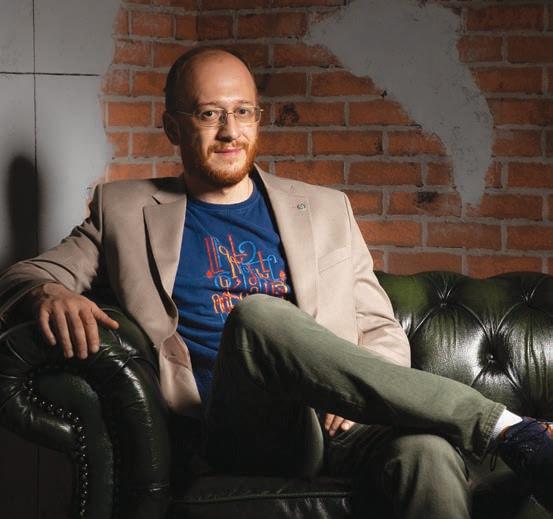
“Generative AI has the amazing ability to learn from huge data repositories and create human-like output, be it text, images, or sound. As impressive as all that is, there’s a catch,” Khachatryan adds. “That catch is that it currently has no mechanism in place to evaluate the quality, meaningfulness, or effectiveness of these responses. I don’t think that one should get overexcited about how humanlike the responses are because human-like, at the end of the day, doesn’t translate necessarily into meaningful.”
In human hands, though, AI is a powerful tool for entrepreneurs.
“Technology continues to propel us forward,” Gillan says. “(AI) helps with the entrepreneurial process, but it is also an entrepreneurial opportunity.”
Overly relying on the seeming ‘magic’ that is provided by generative AI is not going to work. To have your leg up, you still need to put your creative hat on and keep it on at all times.
PHOTO: FASHION BOX STUDIO / ARMENIA 7 6 SUMMER 2023 / BABSON MAGAZINE 25
— Davit Khachatryan, associate professor of statistics, who specializes in machine learning and data science
for Those Too Often Forgotten
By John Crawford
Associate Professor of Practice




Sandra Bravo MBA’87 has spent a lifetime concerned about children in the foster care system. She adopted two foster children and started a nonprofit that aims to rethink the system and raise awareness about its challenges. Even in the face of tragedy, she remains resolute.

RON JAUTZ
PHOTO:
26 BABSON MAGAZINE / SUMMER 2023
When she was in college, Sandra Bravo MBA’87 had the opportunity to mentor a 13-year-old girl in foster care. Her name was Kathy. Mentoring sounded like a nice way to volunteer to Bravo. Perhaps, Bravo thought, she would show Kathy around her college campus.
Soon, however, Bravo realized that mentoring Kathy would not be so simple or carefree. With a mother who was a drug addict and prostitute, Kathy lived a hard, unsettled life. When Kathy visited with Bravo, the college student did all the talking. Kathy stayed quiet.
“I had no idea what foster care was about, how dif cult it was,” says Bravo, associate professor of practice in marketing at Babson. “Kathy would follow me around campus, but she would never look me in the eye, and she would never say a word. I thought, ‘I am in over my head.’ ”
During one visit, Kathy noticed a cloth doll that Bravo’s grandmother had given her. Bravo let her hold it, and then she decided to let her keep it. “Her face lit up. It was like I gave her the best thing she ever had in her life,” Bravo says. “She hugged that doll so tightly, and she looked me right in the eye and she said, ‘Thank you, Sandy.’ ”
A few days later, Kathy’s mother decided that her daughter wouldn’t visit with Bravo anymore. At that moment, Bravo came to a decision. “I decided no child should suffer like this,” Bravo says, “and that one day I would adopt a child out of foster care.”
Since then, Bravo has been lled with concern for the children caught up in the foster care system. She would not only go on to adopt two foster children, J.R. and Elijah, but she also would create a nonpro t, the 440K Project, that aims to raise awareness about the problems plaguing foster care. “I want to rethink how foster care is done with the goal of helping children thrive,” Bravo says.
Even as tragedy would befall one of her children, a loss that left her raw and shaken, Bravo has remained resolute. Foster children, so often overlooked, face lives lled with challenges. Bravo can’t turn her back on them. “I think what really bothers me about foster care above everything is they are completely vulnerable,” she says. “They don’t have a voice. They are just another kid in the system.”
Rethinking Foster Care
That’s not to say that the foster care system doesn’t have good people trying to do the right thing by children, Bravo says, but statistics reveal the tough future that awaits many foster children.
Once they age out of the system, foster children face high rates of homelessness, early pregnancy, substance abuse, and incarceration. “If you look at the stats, no one would say that works,” Bravo says. “The outcomes are evidence of a system that’s dysfunctional.”
The 440K Project is named for the roughly 440,000 children in foster care in the United States. Many spend months or even years in the system before being permanently reunited with their families or adopted. “The child often gets moved from home to home,” Bravo says. “It’s a long process.”
That process can take a toll on children and can leave them traumatized and suffering from PTSD. “They often get attachment disorders because they don’t belong anywhere,” Bravo says. “They fall behind in terms of social, emotional, and educational development.”
Bravo knows this rsthand. She and her husband, Mike, would adopt their rst child, J.R.,when he was 5 years old, after he spent four long years shuf ing between his drug-addicted parents and foster homes. He rst entered the system as a baby after a drug raid on his parents’ house. “When he rst went into foster care at nine months old,” Bravo says, “he didn’t smile or cry or even giggle.”
For more than 20 years, Bravo owned Bravo Communications, a marketing consulting rm, but she has stepped away from it to focus on the 440K Project. She has ambitious goals for the nonpro t. First, she plans to launch a public awareness campaign about a system that many people don’t think about. “The rst phase is to educate and infuriate the nation about foster care,” Bravo says. “The country needs to know. Once you know, then you have some skin in the game.”
SUMMER 2023 / BABSON MAGAZINE 27
As part of that awareness campaign, she hopes to inspire people to adopt the roughly 111,000 children waiting for adoption in foster care. “We want to try to get that 111,000 kids down to zero,” Bravo says. “I realize that’s ambitious, but that doesn’t bother me at all.”
Ultimately, she wants to gather experts together and start to rethink the foster care system so that it ensures better outcomes for children’s lives. “How can the foster care process be done differently so the child is physically, socially, emotionally well?” Bravo asks.
Help from Babson



Bravo can’t do this work alone, and she’s thankful for the team of people that supports her. The star of that team is Mike Bravo, her husband. The pair rst dated in high school, and before they married, Mike surprised Bravo by revealing that he one day wanted to adopt a child, just as she did. “Mike and I have always been a team,” she says. “We’re best friends.”

Mike is on the 440K Project’s board, as are several people with Babson connections (Associate Professor Anjali Bal, entrepreneur Scott DiGiammarino ’84, and young alumna Haley Pesce ’20, who was a star student of Bravo’s). Walton Isaacson, the Culver City, California,



PHOTOS: RON JAUTZ
Sandra Bravo MBA’87 is the founder of the 440K Project, which aims to raise awareness about the problems plaguing foster care. To learn more about the nonprofit’s work, visit 440kproject.org
Sandy Bravo first dated her husband, Mike Bravo, in high school. The couple went on to adopt two foster children together, and Mike sits on the board of the 440K Project.
28 BABSON MAGAZINE / SUMMER 2023
“I want to rethink how foster care is done with the goal of helping children thrive.”
ad agency co-founded by Aaron Walton ’83, has worked pro bono on the awareness campaign that the 440K Project hopes to launch by year’s end.
Walton came on board after Bravo gave him an emotional two-minute pitch about foster care. “When I nished, I looked at Aaron,” Bravo remembers. “He said two words: ‘I’m in.’ ”
Bravo has long been connected to Babson, having earned her MBA here, and she began teaching at the College in 2015. She is amazed by the support the Babson community has given her. “It is just the right place for me,” she says. “It has allowed me to be in a profession I love, and it has given me people who are amazingly talented who are helpful to the 440K Project.”
In particular, she calls out her fellow professors in the College’s Marketing Division. When the unimaginable happened, and Bravo’s days lled with sadness and grief, they stepped in, bringing her food and covering her classes. During a dark time, they were there. “I cannot tell you how grateful I am,” Bravo says.
Compelled to Do This

When the Bravos welcomed J.R. to their family, ful lling a dream that both Sandy and Mike had to adopt a child, the couple loved and supported him. As the years passed, J.R. became a sherman, a skier, and a pilot. He was kind and funny.
Life, though, was not easy for him. “He had a lot of social and emotional issues,” Bravo says. “He struggled with the trauma he experienced in the rst years of his life.” J.R. had trouble with eye contact, even with Bravo, but he often put his arm around her shoulder and said, “Mom, you need to x foster care.”
J.R. passed away on March 8, 2022, of a drug overdose. He was 24. “He took one pill,” Bravo says. “It was laced. It killed him.”

In the painful days that followed, Bravo doubted her work with foster care. How could she ask others to adopt a foster child, she wondered, when she knows how traumatized they are? “I was at the lowest point in my life,” she says. Her husband told her something that kept her going: “Every child deserves a chance.”
Her grief remains, but Bravo has toughened her resolve. “Steel your mind,” she tells herself and keeps a notecard with “steel your mind” written on it by her desk in Malloy Hall. “Steel is one of the strongest substances on earth,” she says.
Attempting to change foster care is obviously a staggering challenge. The system is expansive and
bureaucratic, and the stakes are high, involving the lives of children in troubling circumstances. For inspiration, Bravo looks to her heroes, people such as Candace Lightner, the founder of Mothers Against Drunk Driving, who helped change laws and the culture of the country surrounding drunk driving. “I look to people like that, and how they had an impact on the world in a huge way,” she says. “I am in awe of them.”
Bravo also thinks of J.R., of his arm around her shoulder, of how he kept telling her to x foster care. “I feel like this is what I was meant to do. I feel compelled to do this,” she says. “This is my chance to help these kids.”
Hear Sandra Bravo MBA’87, associate professor of practice in marketing at Babson, discuss her experiences with foster care at this year’s TEDxBabsonCollege.
PHOTO: RON JAUTZ
Sandra and Mike Bravo adopted J.R. from foster care when he was 5 years old. He was kind and funny and learned to ski, fish, and fly a plane, but he struggled with the trauma he experienced in the first years of his life, and J.R. passed away last year at the age of 24.
I think what really bothers me about foster care above everything is they are completely vulnerable. They don’t have a voice. They are just another kid in the system.
SUMMER 2023 / BABSON MAGAZINE 29
— Sandra Bravo MBA’87
ADV ANCEMENT SPOTLIGHT


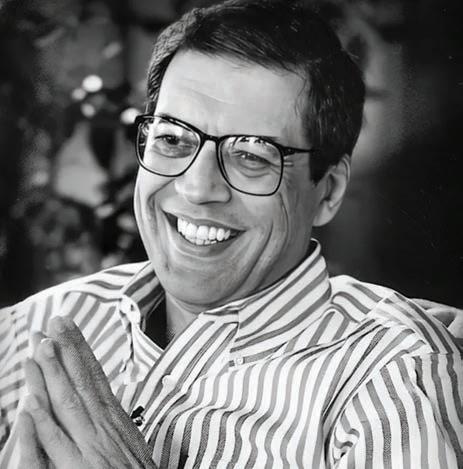
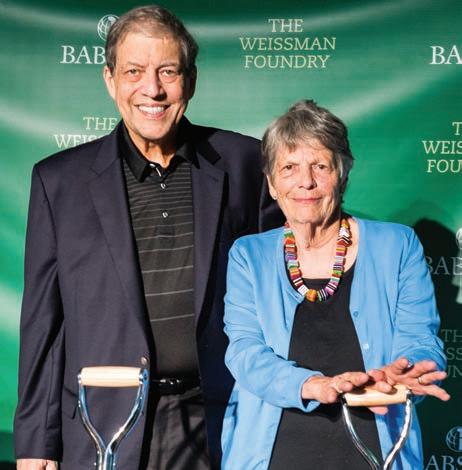
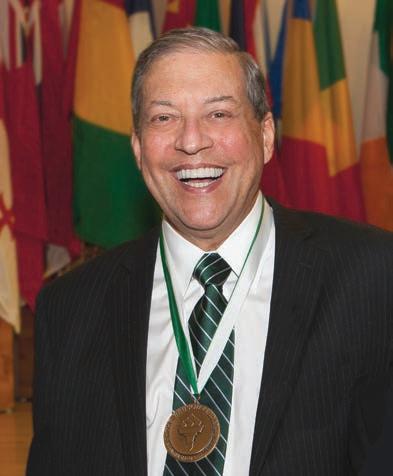
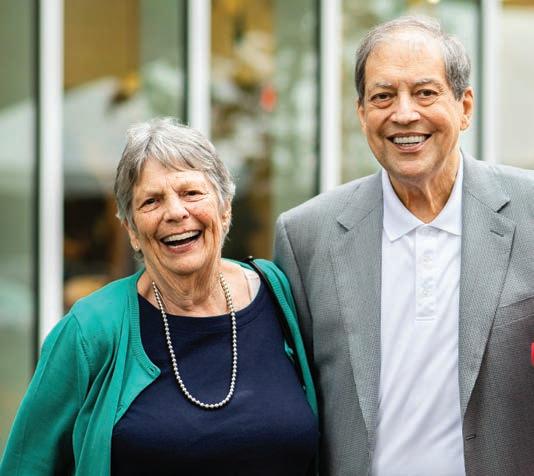
30 BABSON MAGAZINE / SUMMER 2023
PHOTOS: TOP ROW, BOTH BY MARK MANNE; MIDDLE ROW, JUSTIN KNIGHT, FAMILY PHOTO; BOTTOM ROW, MICHAEL CARMEN (RIGHT)
Empowered by his generosity, wisdom, and commitment to creating a worldwide community, Weissman Scholars reflect on the enduring impact of Robert (Bob) Weissman ’64, H’94, P’87 ’90, G’19.
THE WEISSMAN LEGACY
OnMay 11, 2023, Cori Allen ’12 had 30 minutes. A new mom, off a cross-country ight, she had only a half-hour to put into words how when she was 18, the generosity of a stranger changed her life, and how that generosity would go on to change the lives of dozens of other Babson students.
The emotional task was daunting, but she wasn’t willing to let Bob or her friends down.
“On top of the Babson education and everything I learned, I’m here with my 5-month-old son,” says Allen, who is originally from Lawrence, Kansas. “I’m about to go back to this incredible job where I support my whole family. I bought a house in Los Angeles. My husband is going to stay home with our baby.” She’s not sure what would have been possible without her scholarship. “It’s hard to articulate in front of strangers how big that gift was.”
Allen was lling in for her friend Shoney Yakubjanov ’12, who was
By Melissa Savignano
originally scheduled to speak at the Robert Weissman Celebration of Life to commemorate the immense impact of Robert (Bob) Weissman ’64, H’94, P’87 ’90, G’19, who passed away in April.
On this day in May, alumni, friends, and family gathered in Knight Auditorium to hear stories like Allen’s, stories showcasing how one person— in this case, a beloved community member, dedicated alumnus, and trustee—can make such a big impact on the Babson community.
Allen’s remarks speci cally touched on how receiving a scholarship from Weissman made it possible for her to attend Babson. Allen and Yakubjanov are two of the four original recipients of the Weissman Scholarship, a four-year, full-tuition scholarship established in 2008 by Weissman, his wife, Janet P’87 ’90, G’19, and their family.
The Weissman Scholarship is more than just a way for the recipients to pay for college. For some, it’s a chance to try out career paths they didn’t originally
think would be possible. It’s a chance to go to a school where they would meet their future partners, personal and professional. It’s an invitation into a club where a friend will step in for another, even if the prep time is limited.
Described as an “energetic, vigorous, down-to-earth” person, someone who had force and clarity behind his joyful voice, Weissman taught lessons through stories. Scholars describe his advice as more inspiring than prescriptive, and they say he always led with a laugh. He was someone you called on when you needed career advice and when you wanted to learn about hypnotizing chickens.
“You don’t usually go back to your college every year, but we would. He wanted all the scholars to meet each other. He said all of us, all the scholars, were creating this worldwide community,” Allen says. “He said, ‘And that’s going to be my legacy. Invest in each other. Invest in Babson. Invest in this community. And make a dent in the universe together.’ The craziest thing is we did just that. I couldn’t have told you that this is how it was going to turn out, but he could’ve.”
Bob’s memory, lessons, and spirit are a well for the Weissman Scholars to draw from as they build in uential careers and families of their own. And, in a pinch, they can always call each other. Here, Weissman Scholarship alumni re ect on his lessons and legacy on their lives.
SUMMER 2023 / BABSON MAGAZINE 31
“I decided at 13 I was going to go to business school and become an investment banker. When I got the scholarship, it was this huge burden lifted. I got to spend college searching for what mattered to me. I was involved in the student group that helped set the missions for the (Institute for Social Innovation). I was part of the group that persuaded the administration to have a sustainability concentration. I took a semester off to get a certi cation about climate change, which the Weissman Scholarship helped me do.
“I ended up in tech. I took jobs at tiny startups. I worked in Saudi Arabia, Bahrain, Portugal, Spain, and Italy. I’ve had this weird career in my 20s trying things. I’m at Net ix right now, working on one of their new (video game) businesses, which Babson made me good at. If I hadn’t gotten the Weissman Scholarship, I was looking into the face of a scary uphill battle. I got to try things and fail and grow really fast. I didn’t have to play it safe.”


“Here is this incredible man, who is the reason we were able to come to this school. You’re so intimidated that you don’t want to come up to him and say something. Then, you meet him, and he’s one of the most genuine, down-to-earth, nice people you’ve ever met. One of his favorite stories to tell is when he was at UConn before he came to Babson, he was in a fraternity. He talked about how easy it was to hypnotize chickens. He walked us through, step by step, how to do it. It was one of the funniest anecdotes.”
“He had these little nuggets of wisdom. One I remember is ‘You know one of the best ways to be a great person is every time you meet someone, you write their name and info about them on an index card so you can always revisit it.’ Turns out people really notice and care when you remember them. I wouldn’t have been able to come to Babson without the Weissman Scholarship. I did meet my future wife here, so I feel pretty lucky to have made it to Babson.”
32 BABSON MAGAZINE / SUMMER 2023 ADVANCEMENT SPOTLIGHT PHOTO: MARK MANNE
Cori Allen ’12
Product lead at Netflix, Los Angeles
Ria Kale ’21 Senior business systems analyst at Prudential Financial, Hartford, Connecticut
Evan Lehrman ’18
Product manager at LTK, New York City
Cori Allen ’12 spoke on behalf of the Weissman Scholars during the Robert Weissman Celebration of Life on May 11.
Watch the Weissman family’s video tribute
“He was the rst to listen. He was never the rst to talk. I invest in smaller, founder-led businesses. If you sit around and listen, as Bob would, and are curious about what they do, you can apply some basic methodologies and frameworks into helping these entrepreneurs. You can build some interesting companies that can help transform industries and the world. Listening rst separates us from different players in our space.”
“I landed in accounting because my dad is an accountant. When I started my rst job, I was at a loss. It was a lot of hours and not what I wanted.
I talked to his son Michael (Weissman ’87, P’19) about it on the phone and at one of our summits. He really encouraged me that it was time to take a risk and I wouldn’t regret it. I trusted in myself and switched careers. It was a much better t. It was at this job that the Weissmans encouraged me to take that I met my now ancé.”

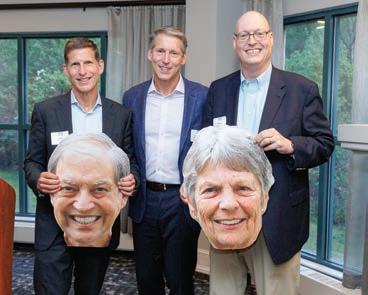
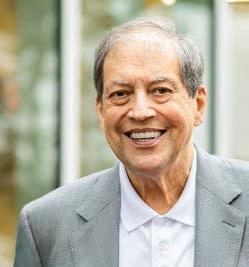 Elena
William Nemeth ’17
Private equity investor at New Heritage Capital, Boston
Ruan ’14, MS’14
Senior finance manager at Cognex Corporation, Natick, Massachusetts
Elena
William Nemeth ’17
Private equity investor at New Heritage Capital, Boston
Ruan ’14, MS’14
Senior finance manager at Cognex Corporation, Natick, Massachusetts
SUMMER 2023 / BABSON MAGAZINE 33 PHOTOS: MICHAEL CARMEN (TOP TWO), PAIGE BROWN (BOTTOM)
Bob Weissman’s words of wisdom: “Remember Babson. Pay it forward.”
Sons (from left) Greg Weissman, Chris Weissman MBA’90, and Michael Weissman ’87, P’19 honor their parents, Bob and Jan (also pictured above), at the Weissman Scholars Graduate Dinner in May.
NEWS NOTES AND NODS
UNDERGRADUATE
1963
Roger Regnier ’63 is planning his class’s 60th reunion, which will be held during Back to Babson, the weekend of Sept. 22–24. “We know we will be challenged fiercely for the 2023 Roger’s Cup,” Regnier wrote. “There’s a large number of classmates who are supporting the effort.”

1982
Steve Connelly ’82, founder of Connelly Partners advertising agency, was awarded the 2023 A-List winner for Best Agency Culture by Ad Age Ad Age, which held its 2023 A-List & Creativity Awards Gala on April 24 in New York, reports on news regarding marketing and the media. The gala highlights the extraordinary work of newcomers and well-established figures in the advertising and marketing industry.
Robert Wahlert ’84 hit the slopes in Breckenridge, Colorado, with a group of his former Babson College rugby teammates. The ski trip has become an annual tradition for the Babson friends, who have been reuniting at the Colorado ski resort for the past 30 years. The alumni at this year’s trip include, from left to right: Steve Libbey ’83, Nick Hathaway ’84, Wahlert, David Levy ’83, Greg Fontana ’84, John Lawler ’84, MBA’89, Ken Jasper ’82, Ken Romanzi ’82, Steve Ashekian ’83, Peter Cain ’84, and Joe Kerwin ’83 Others who often make the trip, but aren’t photographed include Rick Bruno ’83, Bill Farmakis ’83, Paul Kageleiry ’85, and Mike Vazza ’83
 Chantal (Grace) Polsonetti ’84 hosted a St. Patrick’s Day celebration in March, resurrecting a 40-year tradition where Babson alumni get together on the Irish holiday. The gathering, which was on hold during the pandemic, also serves as a birthday party because many in the group have March birthdays. Attendees included (front row, left to right) Paul Baker ’80, Tina (Uhtenwoldt) Oppici ’83, Carolyn Brzezinski ’81, Bill Downing ’80, MaryLou (Landry) Anderson ’83, Marti (Crompton) Johnson ’82, MBA’91, Susan (Chambault) Baker ’82, and Veronica (Grant) Alger ’82; and (back row, left to right) Mandy (Hopper) Nurge ’83, Jeff Johnson ’83, MBA’92, Polsonetti, Linda MacDonald ’82, Lori Sullivan ’82, Roberta (Czarnecki) Woodward ’81, Wendy (Shepherd) O’Brien ’82, Peggy (Kelley) Davis ’81, Michelle (Raso) Carli ’82, P’15, and Sam Davis ’80
Chantal (Grace) Polsonetti ’84 hosted a St. Patrick’s Day celebration in March, resurrecting a 40-year tradition where Babson alumni get together on the Irish holiday. The gathering, which was on hold during the pandemic, also serves as a birthday party because many in the group have March birthdays. Attendees included (front row, left to right) Paul Baker ’80, Tina (Uhtenwoldt) Oppici ’83, Carolyn Brzezinski ’81, Bill Downing ’80, MaryLou (Landry) Anderson ’83, Marti (Crompton) Johnson ’82, MBA’91, Susan (Chambault) Baker ’82, and Veronica (Grant) Alger ’82; and (back row, left to right) Mandy (Hopper) Nurge ’83, Jeff Johnson ’83, MBA’92, Polsonetti, Linda MacDonald ’82, Lori Sullivan ’82, Roberta (Czarnecki) Woodward ’81, Wendy (Shepherd) O’Brien ’82, Peggy (Kelley) Davis ’81, Michelle (Raso) Carli ’82, P’15, and Sam Davis ’80
34 BABSON MAGAZINE / SUMMER 2023
Sheilagh Hamill McNeil ’86 and her classmates had a south-of-the-border reunion in Cancun in April. The friends went to Mexico to reconnect and honor their long-running bond. “We celebrated 41 years of friendship,” McNeil wrote. “We all met freshman year in Green

Charles Hajjar ’86, P’25, who has served on the national board of St. Jude Children’s Research Hospital for more than 20 years, celebrated the TomorrowNite Gala’s 30th anniversary in March. Anne Hajjar, his wife, chaired the event, helping to raise more than $900,000 for St. Jude Children’s Research Hospital. Several other Babson alumni attended the fundraiser, including (from left to right) Paul Natalizio
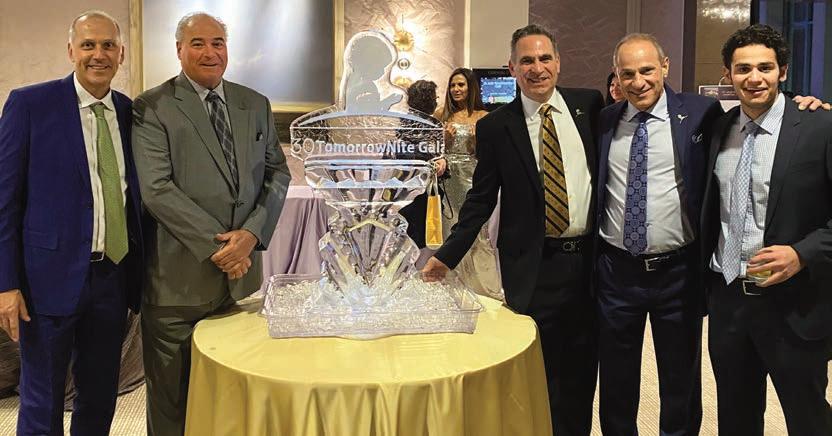 Gables and have maintained our friendship since.”
The group includes (from left to right): Kaylee Dodge Murphy ’86, Gerri Nathan Russo ’86, McNeil, Linda Lackey ’86, Carolyn Fox Mula ’86, Marianne Citro Flayhan ’86, Maryellen Papelian ’86, and Lisa Haskins ’86.
Gables and have maintained our friendship since.”
The group includes (from left to right): Kaylee Dodge Murphy ’86, Gerri Nathan Russo ’86, McNeil, Linda Lackey ’86, Carolyn Fox Mula ’86, Marianne Citro Flayhan ’86, Maryellen Papelian ’86, and Lisa Haskins ’86.
SUMMER 2023 / BABSON MAGAZINE 35
’84, Paul Iantosca ’74, P’00, Peter Roberti ’86, Hajjar, and Richard Hajjar ’25
Andrew
Charles E. Gaudet II ’99 (right), an independent consultant who helps businesses maximize their profits, recently spoke at a gathering of spring manufacturers put together by Don Jacobson III ’01 (left), vice president at the Spring Management Institute. Jacobson hadn’t connected with Gaudet since graduation, but he reached out to Gaudet, founder and CEO of Predictable Profits, and asked him to speak at one of the institute’s meetings. “He absolutely crushed his presentation,” Jacobson wrote. “Charlie was even gracious enough to stay onsite to catch up with me and my wife and participate in the cornhole tournament that afternoon.”

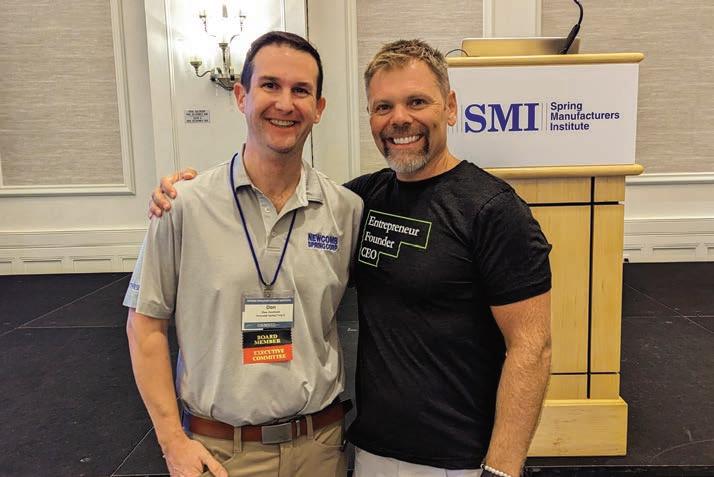
John Hudspeth ’08 was recently named to Financial Planning’s 2023 Top 40 Brokers
Under 40 list. Hudspeth is a Merrill Lynch wealth management financial advisor and serves as senior vice president at his firm, The Hudspeth Group, located in Naples, Florida. Previously, he has been named to the 2022 Forbes Best-in-State Wealth Advisors list and the Forbes Top Next-Generation Wealth Advisors list from 2017 to 2022.
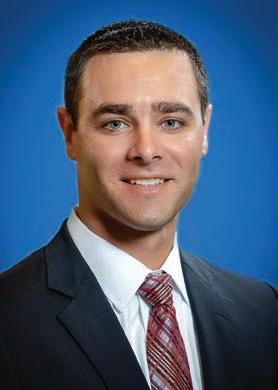 Bank ’90, along with several alumni, gathered to honor their classmate Robert Studley ’90, who died January 27. Alumni in attendance included Pete Conley ’90, Scott Dias ’90, Terence Faherty ’90, Steve Kavanaugh ’90, Brian Kennedy MBA’94, Hank Lawlor ’90, Charlie McCarthy ’90, Peter O’Toole ’90, Ed Pollis ’90, Kevin Richardson ’90, Rob Scheschareg ’90, and Karl Smith ’90. The group gathered to watch a Red Sox game and toast Studley on April 20. “Rob is sorely missed but will never be forgotten,” Bank wrote.
Bank ’90, along with several alumni, gathered to honor their classmate Robert Studley ’90, who died January 27. Alumni in attendance included Pete Conley ’90, Scott Dias ’90, Terence Faherty ’90, Steve Kavanaugh ’90, Brian Kennedy MBA’94, Hank Lawlor ’90, Charlie McCarthy ’90, Peter O’Toole ’90, Ed Pollis ’90, Kevin Richardson ’90, Rob Scheschareg ’90, and Karl Smith ’90. The group gathered to watch a Red Sox game and toast Studley on April 20. “Rob is sorely missed but will never be forgotten,” Bank wrote.
36 BABSON MAGAZINE / SUMMER 2023 NEWSNOTES ANDNODS
Johanna Mouyal ’20 recently released Life Reset: A Holistic Wellness Guide to Nourishing Mind and Body, a book about personal growth and how to improve mental and physical health. “My vision on health focuses on a holistic approach to nourish our three selves: mind, body, and soul,” Mouyal wrote. “After more than two years of research on what the latest scientific research has to say, I’ve compiled my learnings, tips, tricks, and exercises to make a 180-degree (turn) in your life.”
1983
Aaron Walton ’83 was inducted into the American Advertising Federation’s Hall of Fame on April 27 for his innovative work at Walton Issacson marketing agency. Walton is CEO at the Los Angeles-based agency he co-founded with Cory Issacson and Earvin “Magic” Johnson in 2005. The Hall of Fame honor came less than a week after Walton was named Agency Executive of the Year at Ad Age’s 2023 A-List & Creativity Awards Gala. Both events seek to celebrate industry legends who have distinguished themselves through outstanding achievements.
2013
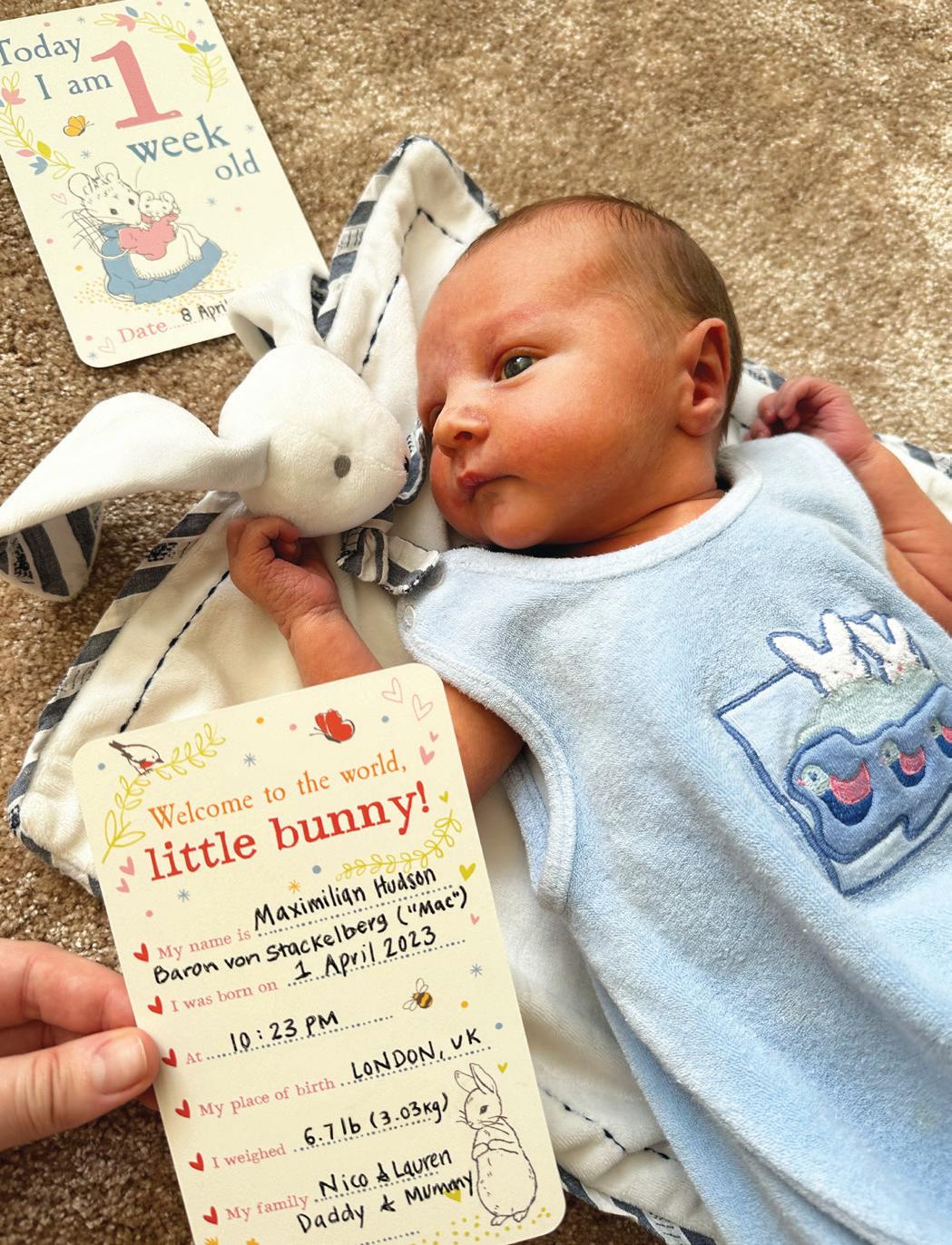
Widmaier M. Charles ’13 joined Todd & Weld LLP as an associate litigation attorney, concentrating his practice on complex civil litigation, including business and real estate litigation. Charles represents clients through
all stages of litigation and arbitration proceedings, such as pleadings, discovery, substantive motions, settlement negotiations, and court appearances for trial. Prior to joining the firm, Charles was a civil litigation attorney focusing on cases involving construction litigation, personal injury, and premises liability. Prior to private practice, he was a judicial law clerk at the Massachusetts Appeals Court, as well as an assistant attorney general at the Massachusetts Attorney General’s Office.
Jessica Lynch ’13, MS’13, MBA’18 announced that her venture, Wishroute, a leading provider of humanpowered engagement and healthy habit coaching, has been acquired by Suggestic, a leading provider of AI-enabled Telewellness solutions. Wishroute, which was a participant in Babson’s Summer Venture Program in 2018, also recently licensed its IP to two other startups, Guidely and Runzy.
 Lauren von Stackelberg ’12 and Nicholas von Stackelberg ’12, welcomed their son, Maximilian Hudson Baron, into the family April 1. Maximilian, who weighed 6 pounds, 7 ounces, “insisted on meeting mum and dad three weeks early,” the new parents wrote.
Lauren von Stackelberg ’12 and Nicholas von Stackelberg ’12, welcomed their son, Maximilian Hudson Baron, into the family April 1. Maximilian, who weighed 6 pounds, 7 ounces, “insisted on meeting mum and dad three weeks early,” the new parents wrote.
SUMMER 2023 / BABSON MAGAZINE 37
GRADUATE 1994
Vicki Dempsey MBA’94, vice president of sales and marketing at Jancyn Inc., said the company recently moved from San Jose to Alameda, California. Jancyn, which was founded in 1980, helps businesses learn more about their customers by using surveys and evaluations. Dempsey has worked at Jancyn since 2009.
2003
Heidy Frank MS’03 was recently named to Morgan Stanley’s Pacesetter’s Club, a global recognition program for financial advisors who have demonstrated high professional standards and first-class client service at an early stage in their career. Frank serves as a financial advisor at Morgan Stanley’s wealth management office in Coral Gables, Florida.
2006
Andrew Walsh MBA’06 joined Verrill Law as partner at the firm’s Westport, Connecticut, office. Walsh will focus on counseling businesses of all sizes—including startups, investment funds, and large corporations, as well as their individual principals—on a variety of legal matters. He also will provide strategic advice on issues such as private securities offerings, shareholder matters, limited partnership opportunities, mergers and acquisitions, corporate governance, restructurings, and other complex legal issues.
2011
Rashel Masters MBA’11 has been promoted to senior documentation manager at Ocient, where she leads a team that creates documentation for the Ocient Hyperscale Data Warehouse. Ocient, based in Chicago, has solutions tailored for hyperscale data sets, enabling organizations to quickly sort through mountains of data to find the most useful information.
2017
Gustavo Mayen MBA’17 received the Western New England University School of Law’s 2023 Ascending Alumni Award. The award recognizes alumni who are within 10 years of graduation from the School of Law and have shown leadership in their chosen field and the community.
2018
Jessica Lynch ’13, MS’13, MBA’18: See Undergraduates, 2013.
Dick Howell MBA’94 recently earned the designation of Five Star Wealth Manager in Boston magazine’s March 2023 issue, the second year he has been named. Howell, formerly vice president of Staples’ e-commerce, analytics, and site operations, joined The Bulfinch Group in 2016, citing “their culture and philosophy toward holistic wealth management.”


Marcus Wise MBA’06 was appointed CEO of Wise Music Group’s European regions. Wise, who was promoted in February, will lead the family business and focus on the organization’s music publishing and record company interests across the continent. “It is both an honor and a privilege to take over the reins of my family’s European business,” Wise said. “I look forward to supporting our historic publishing houses by increasing our core activities in sync and classical music.”
Carmen
6 in Framingham, Massachusetts. Suen, who previously worked at Babson as an engagement specialist at the Bertarelli Institute for Family Entrepreneurship, shared pictures of her classmates, including (from left to right): John Fontaine MBA’21, Zareen Amber ’04, MBA’20, Stephanie Tidman ’11, MBA’21, Benjamin Fradin MBA’21, Jean-Noel Pellegrin MBA’21, Suen, and Amrutha Ananth MBA’21
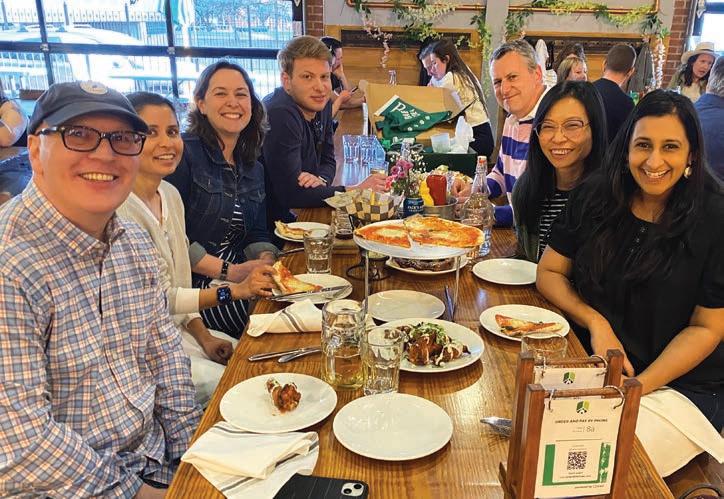 Suen MBA’21 organized a reunion with some of her part-time MBA classmates May
Suen MBA’21 organized a reunion with some of her part-time MBA classmates May
38 BABSON MAGAZINE / SUMMER 2023
GOT NEWS?
ALUMNI NEWS is in demand!
To accommodate news and photos from as many alumni as possible, please limit entries and photo captions to 50 words or less.
Babson Magazine has two requirements for Alumni News photos: The submitting alum must be in the picture, and the image must be at least 4 x 6 inches at 300 dpi—no digital alterations, please. We can’t promise that all submitted photos will run, but we’ll include as many as possible. Submit your latest news to the Alumni News Editor at babson.edu/nods.
MEMORIAM
IN
J. Barkev “J.B.” Kassarjian, of Lebanon, New Hampshire, died May 16. He was a professor of management and taught at Babson for 40 years, serving as chair of the Management Division from 1981 to 1987.
Terrance “Terry” M. Sullivan P’14, of Wellesley, Massachusetts, died April 2. He was the assistant director of Babson’s facilities department and worked in the department for 35 years. Sullivan followed in the footsteps of his father, Ed Sullivan, who headed Babson’s facilities department for 42 years.
Richard L. Biggs ’47, of East Greenwich, Rhode Island, Nov. 11
Charles Elliott Beckman ’49, G’03, of Dartmouth, Massachusetts, April 12
Ralph Frederick Cox ’49, of Yarmouth Port, Massachusetts, May 18
John Gaines Johnston ’51, of Fresno, California, April 17
Stephen Durfee Peirce ’51, of Groton, Connecticut, May 4
Frederick Leroy LaFontaine ’52, of Concord, New Hampshire, May 25
James C. Coulter ’56, of Duxbury, Massachusetts, March 3
Everett R. Bosselait ’57, of Charlotte, North Carolina, May 10
Harry W. Vincent Jr. ’58, of Richmond, Massachusetts, Feb. 27
Robert Henry Buettner ’60, P’92, of Tucson, Arizona, Feb. 5
John Daland Elliot ’60, of St. Petersburg, Florida, May 9
Aaron J. Fuchs ’60, of St. Petersburg, Florida, April 15
Joseph Thomas Scarlata ’60, of Hopkinton, Massachusetts, March 1
Barry Stephen Silver ’61, of Olivette, Missouri, March 13
George Allen Stetson ’61, of Centreville, Delaware, Jan. 28
John Henline Moran ’62, of Tiverton, Rhode Island, Feb. 24
Ronald Kitchener Stribley ’63, MBA’70, of Vero Beach, Florida, May 8
Kenneth David McDonald ’64, of Needham, Massachusetts, April 21
Peter J. Sinnott III ’64, of Rye, New York, April 12
Robert E. Weissman ’64, H’94, P’87 ’90, G’19, of Estero, Florida, April 4
James L. Cooney Jr. ’65, of Lowell, Massachusetts, Feb. 20
Gerald Arthur Levenson MBA’65, of Needham, Massachusetts, April 17
Henry Alan Wheeler ’67, of Needham, Massachusetts, Feb. 16
Robert A. Bower MBA’70, of Denver, Colorado, Feb. 15
Richard W. Garrett MBA’71, of Salem, Massachusetts, Jan. 30
Paul J. Sheehan Jr. MBA’71, of Wrentham, Massachusetts, Feb. 2
Paul Robert Bednarz ’73, of Marlborough, Massachusetts, May 22
Jeffrey L. Bromberg ’73, MBA’74, of Boxford, Massachusetts, April 11
Richard Allen Steiner ’74, of Westerville, Ohio, May 19
James Michael Wilson MBA’75, of Saint Helena, California, Jan. 22
Edward L. Simmons ’76, of New York City, New York, Jan. 22
Paul Hohl MBA’76, of Zurich, Switzerland, Feb. 13
Barbara Jean Stevenson ’77, MBA’82, of Port Angeles, Washington, April 25
Christos L. Tsokanis MBA’77, of Marshfield, Massachusetts, March 11
Frederick R. Hatfield Jr. ’78, M’79, of Chandler, Arizona, July 28, 2021
Joseph Edmund Minihan ’80, of Falmouth, Massachusetts, Jan. 26
Stacey Ann McCarthy ’81, of Portland, Maine, April 26
Joshua Leland Evans ’83, of Old Bridge, New Jersey, Dec. 27, 2020
Michael Leo Neville MBA’83, of North Reading, Massachusetts, May 14
Ilene Nusblatt ’84, of Newtown, Pennsylvania, Feb. 24
Jeffrey Rich Cagnina Sr. ’85, of Dallas, Texas, Feb. 20
A. Dale McMullan MBA’85, of Lancaster, Massachusetts, April 9
Jeffry Michael Morrison ’86, P’19, of Cohasset, Massachusetts, March 28
Herman Paraison Jr. ’86, of Dallas, Texas, March 30
Robert H. Studley ’90, of Boxford, Massachusetts, Jan. 27
Christopher L. Sherman ’93, of Honeoye, New York, May 11
Daniel J. Freeman MBA’93, of Plymouth, Massachusetts, March 15
Michael M. Scanlon MBA’93, of Lynnfield, Massachusetts, April 18
Shoichiro Toyoda H’94, P’82, G’14, of Tokyo, Japan, Feb. 14
Richard J. Wanstall MBA’98, of Watertown, Massachusetts, April 29
Rachel Avery Connell MBA’99, of Portsmouth, New Hampshire, March 14
Cynthia Cortez Kamishlian MBA’00, of Cambridge, Massachusetts, March 26
Eric Tie ’02, of Wilton, Maine, March 7
Steven David Woodward MBA’04, of Carmel, Indiana, April 1
Sreenivasa R. Tadimarri MBA’09, of Lexington, Massachusetts, May 6
SUMMER 2023 / BABSON MAGAZINE 39
Solving Food Insecurity One Row at a Time
THROUGH LOCAL VEGETABLE GARDENS, MARVIN MAKOFSKY ’64 FEEDS A NEED
fter leading his own companies for more than 50 years, Marvin Makofsky ’64 is especially passionate about his current role: chief vegetable garden of cer.
He has applied the entrepreneurial thinking that served him well in business to the problem of food insecurity. In 2010, Makofsky began brainstorming ways to get fresh vegetables to clients of a food pantry in his community of Port Washington, New York. “People who can’t afford the price of tomatoes basically only get nonperishable things donated to them,” he explains.
He started recruiting community members with vegetable gardens to share their bounty. He also partnered with a garden center that agreed to share its refrigerators and serve as a drop-off point for gardeners’ veggies. Volunteers helped transport them to the food pantry, and Plant a Row for the Hungry was born.

Creative problem-solving was a hallmark of Makofsky’s long career in printing-related ventures. In 1972, he launched a company that designed specialized business forms but pivoted often as computers changed the way businesses operated. “Gradually, I saw the beginning of the end of business forms as we know it, and I saw the applications for envelopes and pocket folders,” he says.
This led him in 2001 to start Conformer Products Inc., which currently specializes in eco-friendly

paperboard mailers that are popular with e-commerce companies. Daily operations are run by Makofsky’s son, Bob, and the two of them hold more than 20 patents for products, including envelopes. Bob’s involvement “allows me to do the things that I love to do in terms of giving back,” Makofsky says.
His innovative thinking has allowed Plant a Row for the Hungry, a nonpro t since 2016, to ourish. He launched a painted pots program that invites businesses and other organizations to purchase and display pots decorated by local students, including blind and autistic students through collaboration with the Helen Keller National Center and The Nicholas Center. There are now 125 pots across Port Washington, which serve as mini vegetable gardens tended by an army of volunteers. And, in 2022, Makofsky persuaded the local town council to allow him to plant a garden on unused town land.
Makofsky has developed strong partnerships with the ScottsMiracleGro Company and the Home Depot Foundation, both of which have donated materials and labor to Plant a Row’s efforts. He’s proud that he has engaged a wide swath of the community in addressing hunger, from
preschoolers to senior citizens, high school art students to accomplished artists, beginners to master gardeners. All of these efforts have yielded more than 57,000 pounds of produce delivered to the food pantry since 2010.
Makofsky’s generous instinct was nurtured in college. “Babson emphasized giving back and contributing to your local community wherever you set up your business,” he says. “I’ve done that for decades, and it gives me a great deal of pleasure.”
— Erin O’Donnell
PHOTO: RON JAUTZ
A look at entrepreneurial leaders shaped by their Babson College experience.
40 BABSON MAGAZINE / SUMMER 2023 ENTREPRENEURIAL LEADERSHIPIN ACTION
Marvin Makofsky ’64 started Plant a Row for the Hungry to get fresh vegetables to clients of a local food pantry.
Face today’s challenges and create lasting solutions with the #1 ranked MBA in entrepreneurship
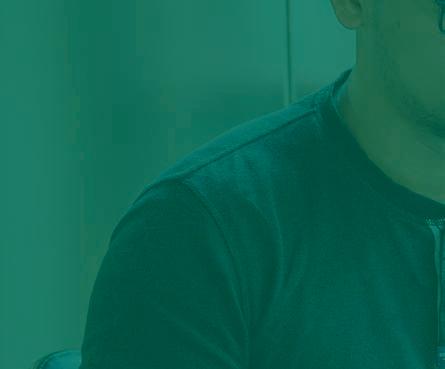
Collaborate. Pioneer. Inspire.
Part-Time Flex MBA
In person with hybrid flexibility
Part-Time Online MBA
Fully virtual live classroom experience
babson.edu/ptprograms
Are you a Babson alum?
Take advantage of a 20% Lifelong Learners grant applicable toward all Babson graduate programs.






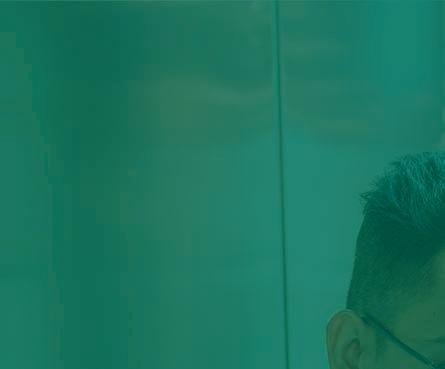

EM2-5360/06-2023

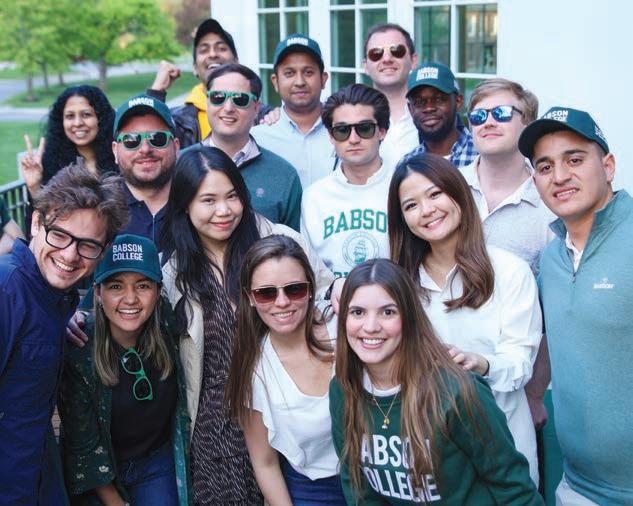
October 4, 2023 Join us for Make Your Mark, our annual giving day that supports campus programs, scholarships, and more. Learn more at babson.edu/MakeYourMark BABSON DAY OF GIVING
Babson Park, MA 02457-0310
babson.edu/backtobabson


























 CURTIS JOHNSON ’23
CURTIS JOHNSON ’23



 By Hillary Chabot
By Hillary Chabot





























 — Rich Palmer MBA’16, managing director,
— Rich Palmer MBA’16, managing director,






 PHOTO: MICHAEL QUIET
Babson alumni Joshua Herzig-Marx MBA’08 (left) and Rich Palmer MBA’16 check out AI’s creative possibilities inside the College’s Weissman Foundry.
PHOTO: MICHAEL QUIET
Babson alumni Joshua Herzig-Marx MBA’08 (left) and Rich Palmer MBA’16 check out AI’s creative possibilities inside the College’s Weissman Foundry.
























 Elena
William Nemeth ’17
Private equity investor at New Heritage Capital, Boston
Ruan ’14, MS’14
Senior finance manager at Cognex Corporation, Natick, Massachusetts
Elena
William Nemeth ’17
Private equity investor at New Heritage Capital, Boston
Ruan ’14, MS’14
Senior finance manager at Cognex Corporation, Natick, Massachusetts

 Chantal (Grace) Polsonetti ’84 hosted a St. Patrick’s Day celebration in March, resurrecting a 40-year tradition where Babson alumni get together on the Irish holiday. The gathering, which was on hold during the pandemic, also serves as a birthday party because many in the group have March birthdays. Attendees included (front row, left to right) Paul Baker ’80, Tina (Uhtenwoldt) Oppici ’83, Carolyn Brzezinski ’81, Bill Downing ’80, MaryLou (Landry) Anderson ’83, Marti (Crompton) Johnson ’82, MBA’91, Susan (Chambault) Baker ’82, and Veronica (Grant) Alger ’82; and (back row, left to right) Mandy (Hopper) Nurge ’83, Jeff Johnson ’83, MBA’92, Polsonetti, Linda MacDonald ’82, Lori Sullivan ’82, Roberta (Czarnecki) Woodward ’81, Wendy (Shepherd) O’Brien ’82, Peggy (Kelley) Davis ’81, Michelle (Raso) Carli ’82, P’15, and Sam Davis ’80
Chantal (Grace) Polsonetti ’84 hosted a St. Patrick’s Day celebration in March, resurrecting a 40-year tradition where Babson alumni get together on the Irish holiday. The gathering, which was on hold during the pandemic, also serves as a birthday party because many in the group have March birthdays. Attendees included (front row, left to right) Paul Baker ’80, Tina (Uhtenwoldt) Oppici ’83, Carolyn Brzezinski ’81, Bill Downing ’80, MaryLou (Landry) Anderson ’83, Marti (Crompton) Johnson ’82, MBA’91, Susan (Chambault) Baker ’82, and Veronica (Grant) Alger ’82; and (back row, left to right) Mandy (Hopper) Nurge ’83, Jeff Johnson ’83, MBA’92, Polsonetti, Linda MacDonald ’82, Lori Sullivan ’82, Roberta (Czarnecki) Woodward ’81, Wendy (Shepherd) O’Brien ’82, Peggy (Kelley) Davis ’81, Michelle (Raso) Carli ’82, P’15, and Sam Davis ’80

 Gables and have maintained our friendship since.”
The group includes (from left to right): Kaylee Dodge Murphy ’86, Gerri Nathan Russo ’86, McNeil, Linda Lackey ’86, Carolyn Fox Mula ’86, Marianne Citro Flayhan ’86, Maryellen Papelian ’86, and Lisa Haskins ’86.
Gables and have maintained our friendship since.”
The group includes (from left to right): Kaylee Dodge Murphy ’86, Gerri Nathan Russo ’86, McNeil, Linda Lackey ’86, Carolyn Fox Mula ’86, Marianne Citro Flayhan ’86, Maryellen Papelian ’86, and Lisa Haskins ’86.


 Bank ’90, along with several alumni, gathered to honor their classmate Robert Studley ’90, who died January 27. Alumni in attendance included Pete Conley ’90, Scott Dias ’90, Terence Faherty ’90, Steve Kavanaugh ’90, Brian Kennedy MBA’94, Hank Lawlor ’90, Charlie McCarthy ’90, Peter O’Toole ’90, Ed Pollis ’90, Kevin Richardson ’90, Rob Scheschareg ’90, and Karl Smith ’90. The group gathered to watch a Red Sox game and toast Studley on April 20. “Rob is sorely missed but will never be forgotten,” Bank wrote.
Bank ’90, along with several alumni, gathered to honor their classmate Robert Studley ’90, who died January 27. Alumni in attendance included Pete Conley ’90, Scott Dias ’90, Terence Faherty ’90, Steve Kavanaugh ’90, Brian Kennedy MBA’94, Hank Lawlor ’90, Charlie McCarthy ’90, Peter O’Toole ’90, Ed Pollis ’90, Kevin Richardson ’90, Rob Scheschareg ’90, and Karl Smith ’90. The group gathered to watch a Red Sox game and toast Studley on April 20. “Rob is sorely missed but will never be forgotten,” Bank wrote.

 Lauren von Stackelberg ’12 and Nicholas von Stackelberg ’12, welcomed their son, Maximilian Hudson Baron, into the family April 1. Maximilian, who weighed 6 pounds, 7 ounces, “insisted on meeting mum and dad three weeks early,” the new parents wrote.
Lauren von Stackelberg ’12 and Nicholas von Stackelberg ’12, welcomed their son, Maximilian Hudson Baron, into the family April 1. Maximilian, who weighed 6 pounds, 7 ounces, “insisted on meeting mum and dad three weeks early,” the new parents wrote.


 Suen MBA’21 organized a reunion with some of her part-time MBA classmates May
Suen MBA’21 organized a reunion with some of her part-time MBA classmates May












